#stele forest
Explore tagged Tumblr posts
Text
Apr 11, Xi'an, China, Beilin Museum (Stele Forest):
I must preface this post with an unfortunate news: because the Museum dug up a Tang dynasty taimiao/太庙 (imperial ancestral shrine) within the Museum area itself while renovating, all of the actual steles have been moved in order to begin excavation, and all we saw were ink rubbings of the steles. I will provide some pics I found online of the actual steles where possible.
Jingjiao Stele/大秦景教流行中国碑:
First up is one of the most famous steles of the Beilin Museum, known in the West as the Jingjiao Stele or the Nestorian Stele. The actual name is 大秦景教流行中国碑, which translates to "Memorial of the Propagation in China of Jingjiao from Daqin". Jingjiao/景教 is the ancient Chinese name of Church of the East, and Daqin/大秦 is the ancient Chinese name for Eastern Roman Empire. The stele was first erected in 781 AD (Tang dynasty, during reign of Emperor Dezong of Tang).
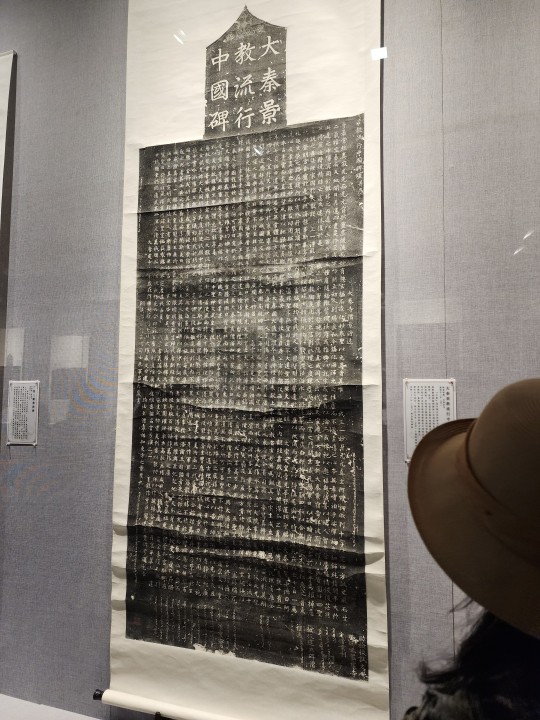
This stele is not only valuable because of what it records, but also because it has Syriac on it too:
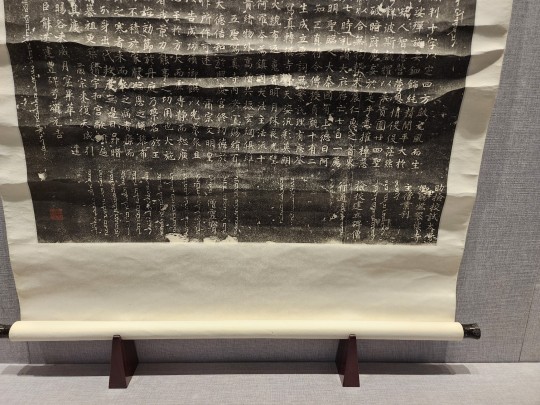
According to Wikipedia this is what the Syriac text on the bottom says:
"In the year of the Greeks one thousand and ninety-two, the Lord Yazedbuzid, Priest and Vicar-episcopal of Cumdan the royal city, son of the enlightened Mailas, Priest of Balach a city of Turkestan, set up this tablet, whereon is inscribed the Dispensation of our Redeemer, and the preaching of the apostolic missionaries to the King of China. ["The Priest Lingpau", in Chinese] "Adam the Deacon, son of Yazedbuzid, vicar-episcopal. The Lord Sergius, Priest and Vicar-episcopal. Sabar Jesus, Priest. Gabriel, Priest, Archdeacon, and Ecclesiarch of Cumdan and Sarag."
Here's the full view of the actual stele and the full text:
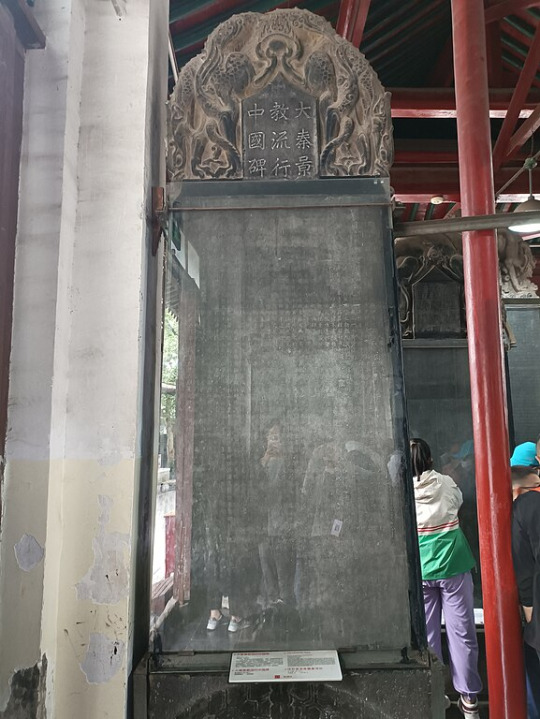
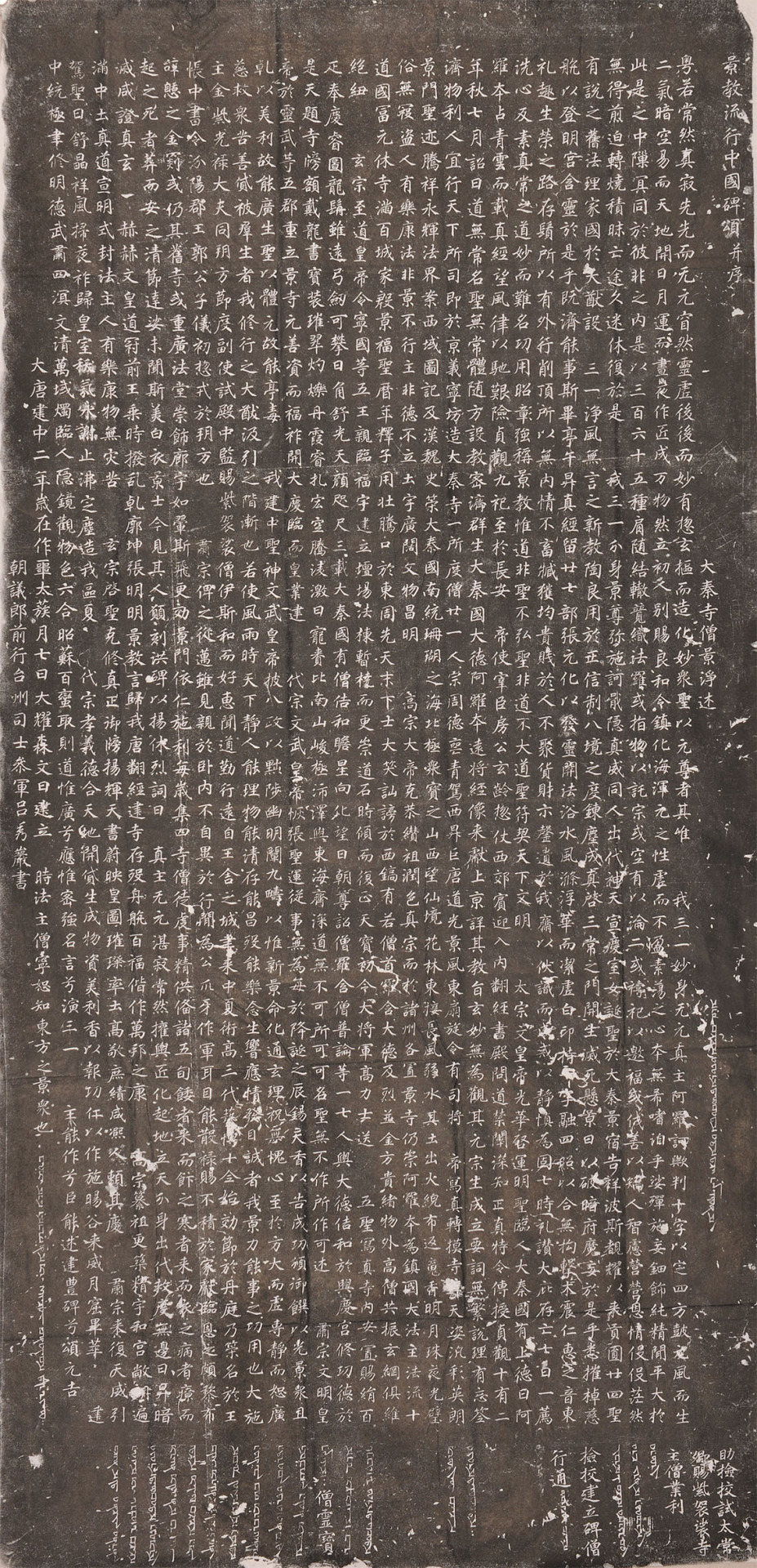
Letter about a Stomachache/肚痛帖:
This is my personal favorite, by famous Tang dynasty calligrapher Zhang Xu/张旭 (685 ? - 759 ?). This work is hailed as one of the greatest examples of Caoshu/Cursive Script/草书.
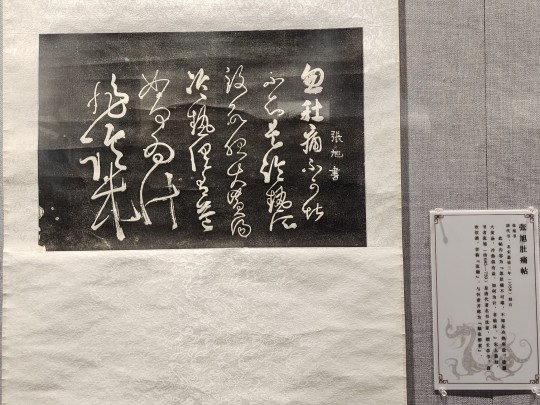
The actual contents are quite funny, however, and it roughly reads:
忽肚痛不可堪,
"Suddenly I have an unbearable stomachache,
不知是冷熱所致,
I don't know if it's because of the cold or the heat,
欲服大黃湯,
I wanted to drink some medicine,
冷熱俱有益。
Which should alleviate the symptoms regardless of the cause.
如何為計,
What should I do,
非臨床。"
Not near bed."
Because Zhang Xu may have been trying to hold it back while writing, you can see feel how his stomachache progressed in the way he wrote everything. Caoshu truly is an expressive script. In fact it's so expressive, the last three characters (on the very left) have become unsolved mysteries in academia. In my own translation above, I just directly translated the three characters that most academics think is on the last line.

Logograms Making up a Picture--Kuixing Pointing at the Dipper/集字魁星点斗图:
This is a very interesting stele, in that it's a carving of a painting that's made up of Chinese characters, which evolved from pictures themselves. The painting is by Ma Dezhao/马德昭, and the stele was erected between 1862 - 1874 (Qing dynasty). It depicts the Kuixing/魁星 (translated as "god of literature", but he's not the only god of literature btw) standing on the back of an Ao/鳌 (mythical turtle creature) and pointing at the character 斗, which is short for the Big Dipper.
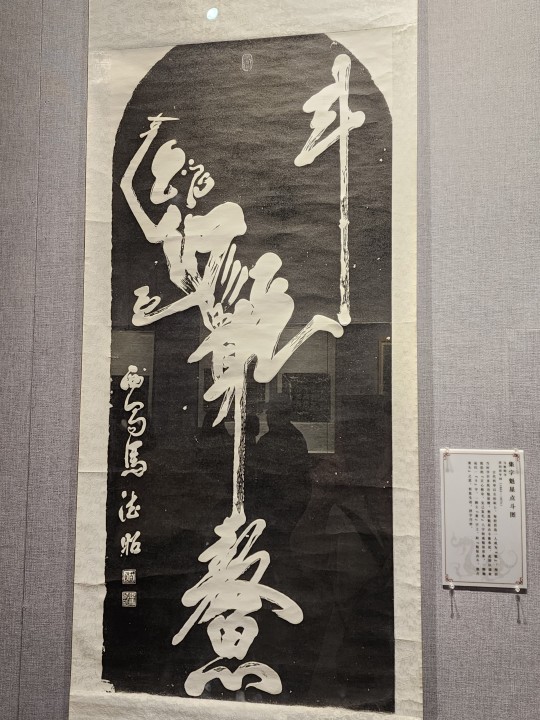
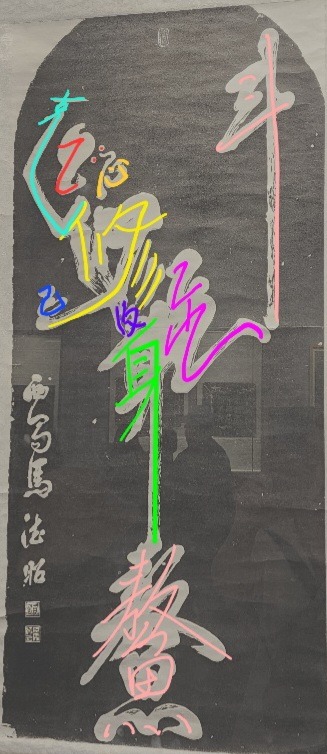
The characters making up the god of literature reads:
“正心修身,克己複禮” (written out above in red-orange-yellow-green-cyan-blue-purple-magenta), which roughly translates to "rectify your mind, improve yourself, have self-restraint, and practice good manners".
This painting subject also has a legend behind it. One version says that when Kuixing was a human, he was a talented and learned scholar who received first place (called zhuangyuan/状元) in the imperial exams, but because his ugly appearance scared the empress, he was chased out of the palace. Out of anger at how he was treated, he threw himself into the sea and drowned. The Jade Emperor pitied him, so he gave the scholar a red brush, and made him watch over all imperial examinations. Thus Kuixing became the god of all students and aspiring scholars.
Logograms Hidden in the Picture--Bamboo Poem about Guanyu/关帝诗竹:
This stele erected by Han Zai/韩宰 in 1716 (Qing dynasty) is similar to the previous one in that it's also a picture made up of Chinese characters, but it's more hidden within the picture.
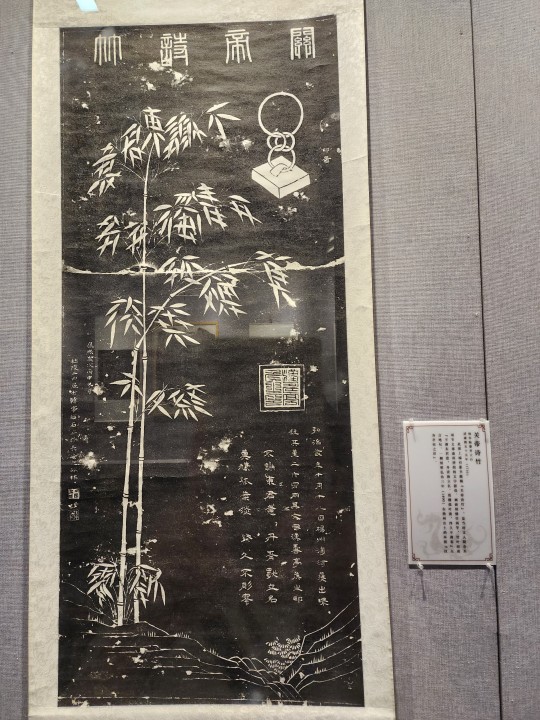
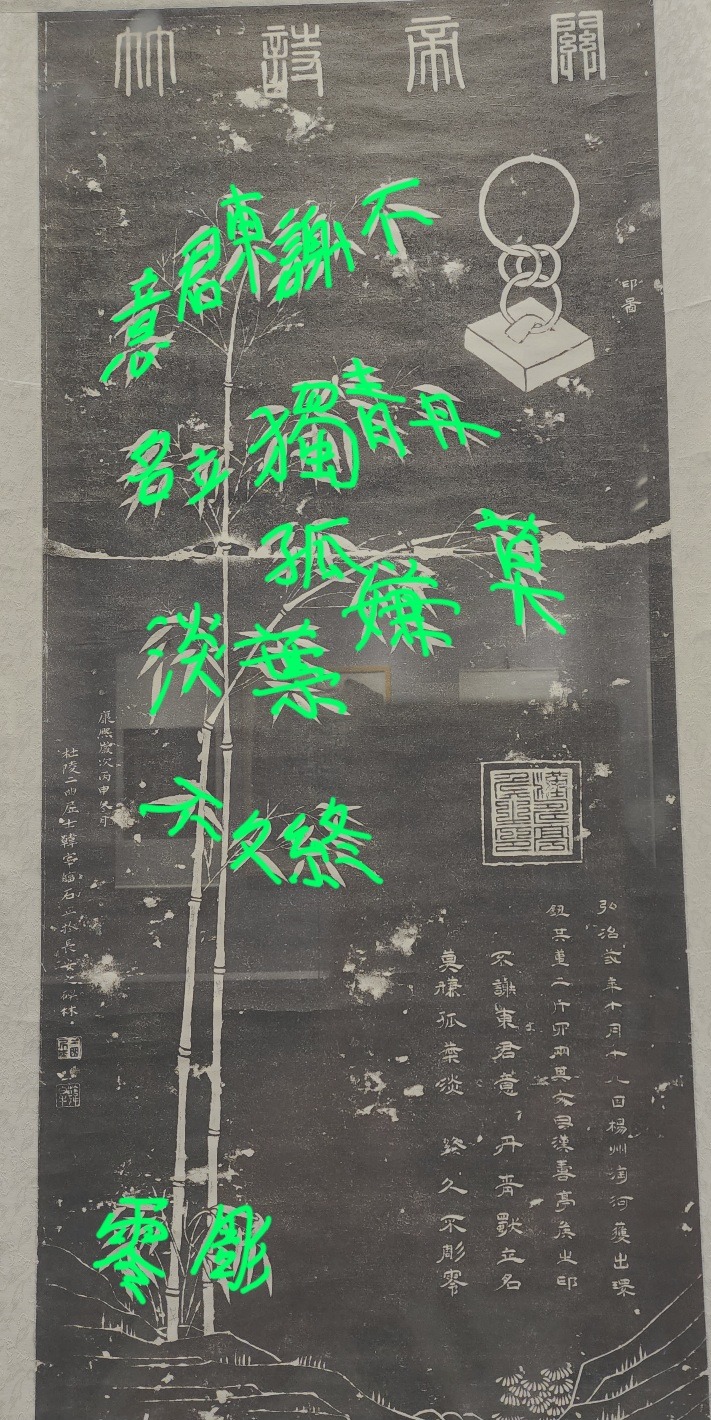
It's a poem about Guanyu/关羽, the famous general during Three Kingdoms period (220 AD - 280 AD), and it reads:
不謝東君意,
I shall not be thanking the spring wind's kindness directly, ("spring wind" here refers to Cao Cao/曹操, who treated Guanyu well)
丹青獨立名。
But shall leave my name in history as an upright loyal person.
莫嫌孤葉淡,
Although the leaves may be sparse,
終久不凋零。
They will never wither and fall.
The poem was supposed written by Guanyu before he left Cao Cao to reunite with his sworn brother Liu Bei/刘备, and uses the imagery of bamboo--both in a visual sense and in a literary sense--as a metaphor for Guanyu's unwavering loyalty.
One Stroke "Longevity"/一笔“壽”:
Again by Ma Dezhao/马德昭, this time in 1870. I must say I like his ideas. This is an abstract calligraphy piece of the character for longevity/壽, written in one stroke, but is actually composed of the numbers 九十九 (99) and 二十一 (21) (read from top down). Because 99 + 21 = 120, and if anyone can live to be 120, they will have lived a long life indeed.
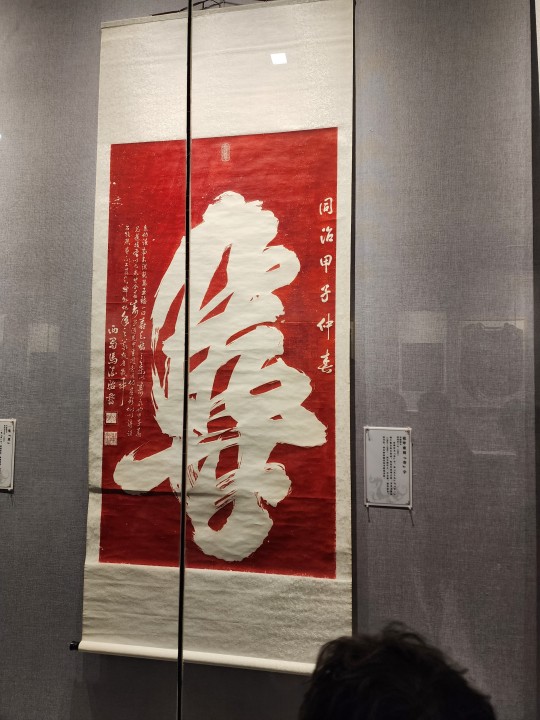
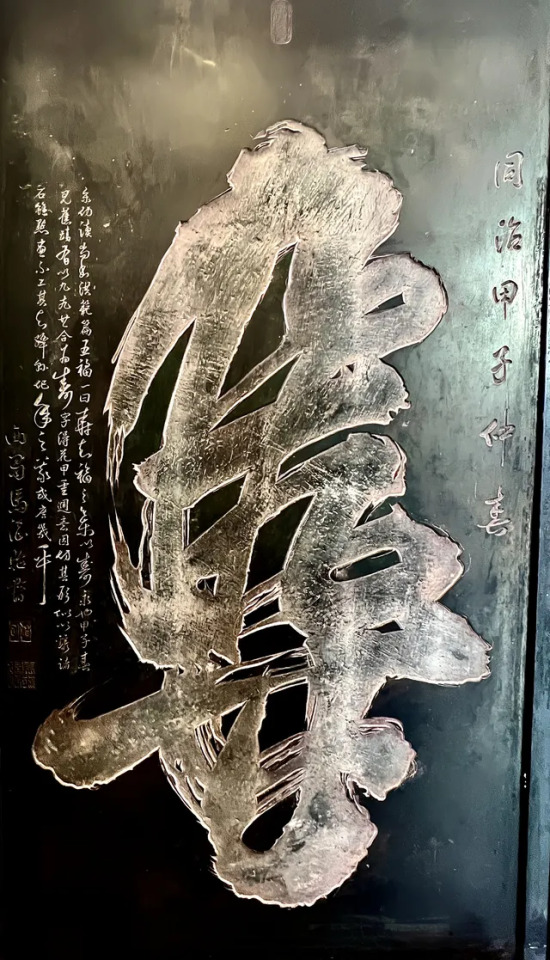
Pine and Red Crowned Crane/松鹤图:
By painter Zhu Jiyi/朱集义 in 1680 (Qing dynasty). Pine in traditional Chinese imagery means resilience and longevity, and red crowned crane also symbolize longevity, especially in Daoist imagery where they are the mount of choice for many immortals. Together they make up the word 松鹤延年, which means "pine and crane brings longevity".
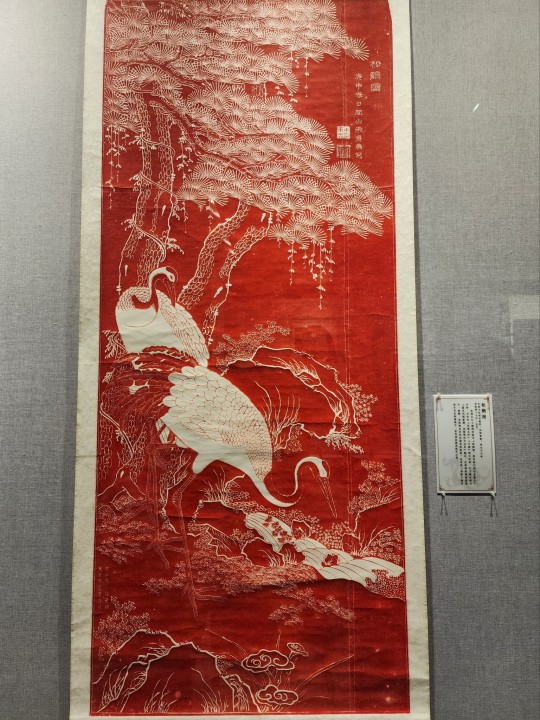
Dongpo's Authentic Work/东坡真迹:
This is an authentic calligraphy work by Su Shi/苏轼 (1037 AD - 1101 AD), whose pen name is Dongpo/东坡. The stele was erected in 1081 AD. Here he wrote down Returning Homeward/归去来兮辞 by Tao Yuanming/陶渊明 (365 AD - 427 AD).
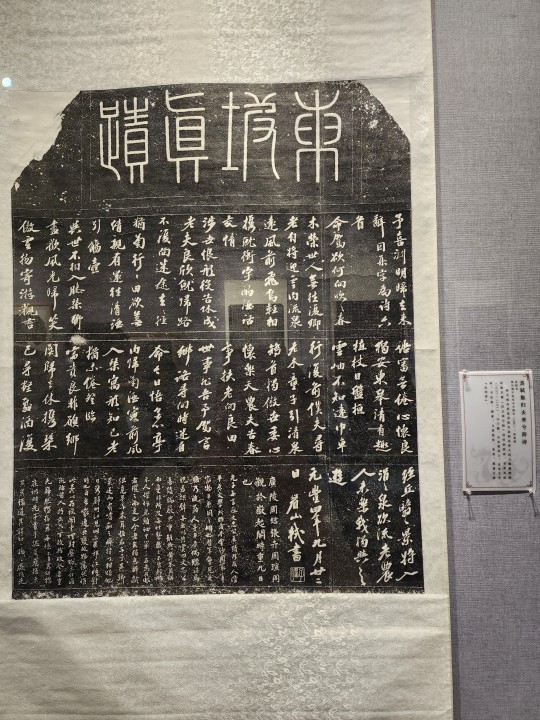
Xie Fangbao's Epitaph/解方保墓志:
Epitaph of Xie Fangbao/解方保, a Sui dynasty (581 AD - 618 AD) general who died in 610 AD. Ancient Chinese epitaphs have a two-piece structure, the tablet where the epitaph is engraved (right), and a protective stone covering that has the deceased's name and title engraved on top (left), surrounded by engravings of imagery that represent the universe. This epitaph is considered to be an excellent example of Sui dynasty epitaphs and calligraphy.
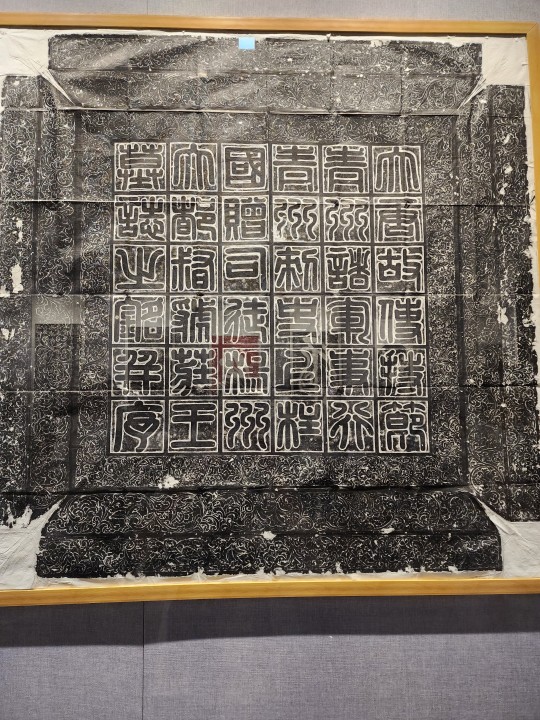
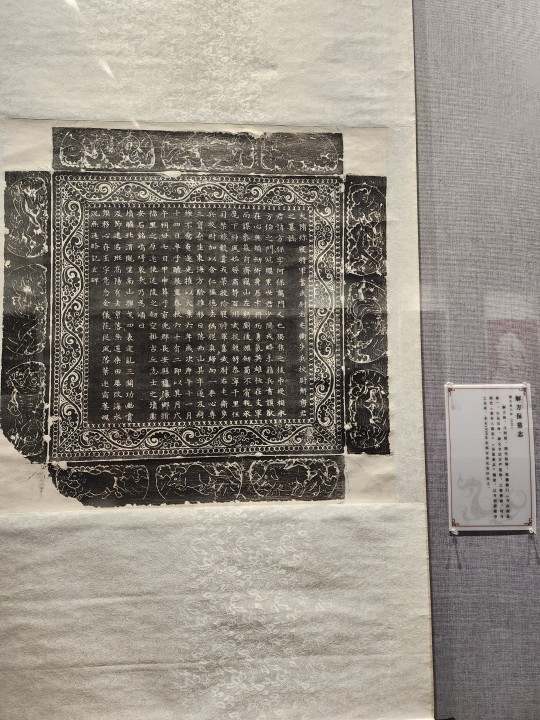
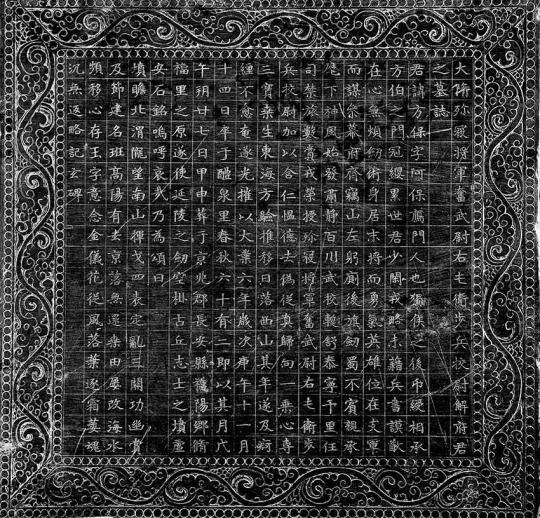
#2024 china#china#xi'an#beilin museum#stele forest#chinese culture#chinese history#chinese calligraphy#calligraphy#chinese art
112 notes
·
View notes
Text
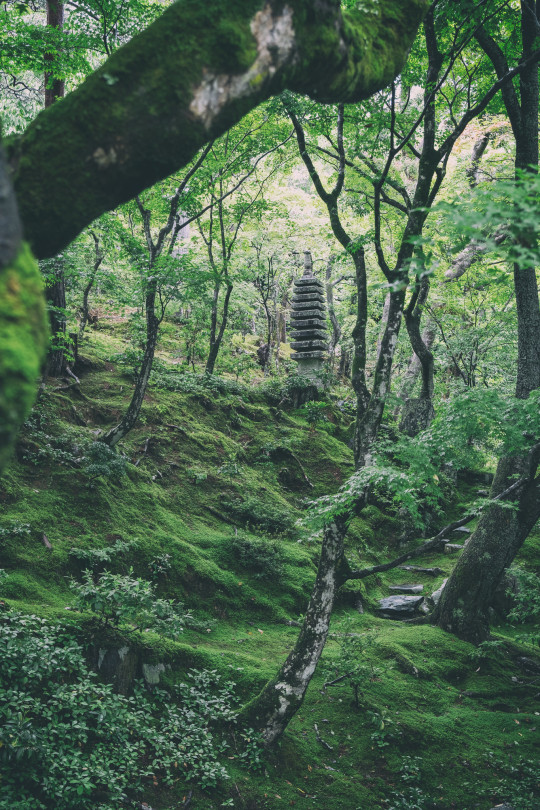
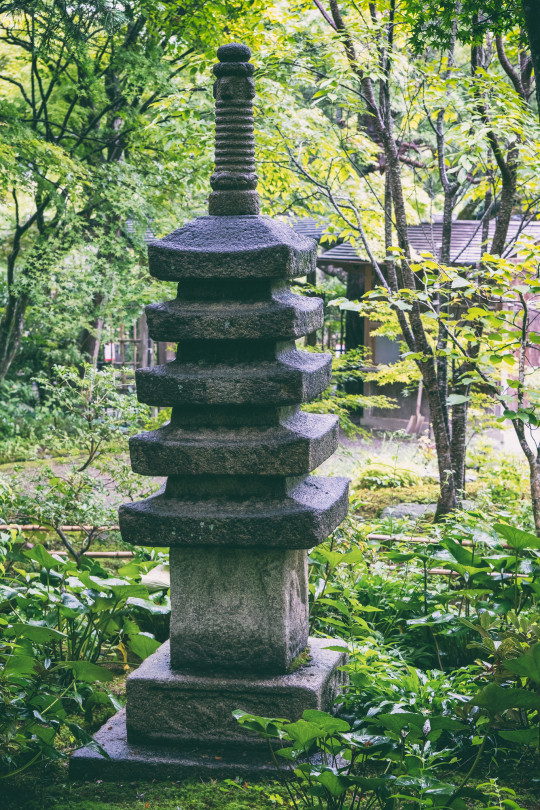
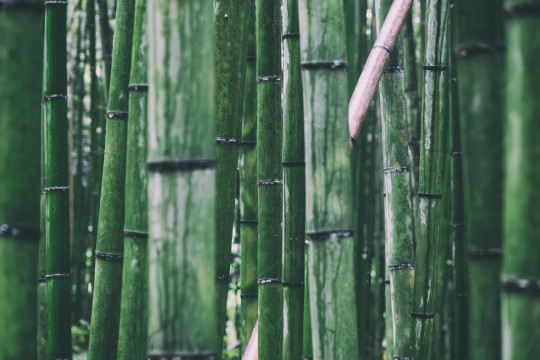
Kyoto (2) (3) by Garret Speed
9 notes
·
View notes
Text
𝐓𝐡𝐞 𝐖𝐢𝐭𝐜𝐡𝐞𝐫 𝐚𝐧𝐝 𝐭𝐡𝐞 𝐒𝐡𝐚𝐝𝐨𝐰 {The Witcher x F!Reader}

1: 𝐓𝐡𝐞 𝐄𝐝𝐠𝐞 𝐨𝐟 𝐭𝐡𝐞 𝐖𝐨𝐫𝐥𝐝 (pt. 1)
The chirping of birds woke the nineteen-year-old y/n up. She cracked her eyes open, having a difficulty to do so due to the light of the sun, and found herself laying in a forest. She sat up slowly, clenching the pendant that was hanging around her neck tightly and looked around in sheer confusion.
How did she even end up here? She was on a mission with her siblings. Knowing that it didn't include the woods. She quickly searched around for her stuff. She had her seraph blade, her stele was on her jacket's pocket along with a sensor and her witchlight stone. She stood up on her feet with a small stumble and continued to look at her surroundings confused.
The air was clearer, deprived of pollution. It was nice but scary too.
Where was she? Had she been teleported there and how?
Not expecting to get any answers from just standing there and staring, she walked her way out of the forest. Or at least tried to. No sign of a city but a small village. Too medieval-like for her own liking.
Hopefully the mundanes were just filming a movie with that theme. As she approached, her nostrils picked up some unpleasant smells which caused her to gag in disgust.
It smelled worse than a farm or litter boxes. She had been to villages before but none of them smelled like that.
She went pass a few locals, all of them dressed in medieval styled peasant clothing, and some gave her some odd looks while others minded their own business. Y/n's brows furrowed. She looked around, expecting to see some cameramen filming the entire thing or the staff.
She saw none.
What she did see was a cart, drawn by two piebald mares. She tilted her head to the side as she cautiously followed and examined the people on it.
Three. The driver. Nothing too unusual for the theme of the movie - if it was a movie; he was wearing sheepskin over his bare skin and his hair reached his brows. Next to him sat another man; that one was slim, he was wearing a fancy bonnet with a heron's feather decorating it. She noticed that he was holding a lute. A troubadour, she mentally noted.
Her eyes trailed to the man next to him. He was skinny, unhealthy pale and had milky loose hair. What she could make of his appearance from the far back was that he was a warrior of sorts.
She didn't know what but there was something about that man that piqued her interest. If her brothers were there they would be able to restrain her from going off to satisfy her curiosity. Her sister, though, would go along with her.
The white haired male spoke to the driver and he brought the horses to a halt. Y/n didn't know why but she felt like the white haired man could tell that she was following them.
Her suspicion was confirmed as he jumped out of the cart, daggers on each side and a steel sword on the back, and approached her.
She came to a halt as she gasped instinctively. His face. She had seen worse but there was something unsettling about him. His eyes were frightening and cat-like and there was something about him. . . Cold and threatening.
Her fingers tried to reach for her blades but he spoke. "Why are you following us?"
His voice was just as unsettling as the rest of his appearance. It was very unpleasant and hoarse. Y/n never had encountered anyone like him. She had seen things and yet this man made her feel afraid.
Why? She had killed demons, a man with a disturbing appearance should be nothing compared to her previous encounters.
He asked her again. More demanding but still calm. "Well?"
She flinched but finally found her voice. "I am sorry." She apologised and thought that the truth would be the best answer. "I am new around. . . . here and you three looked like an interesting bunch. Would it, ah, be alright to tag along until I find a way back?"
He seemed to think about it. His inhuman eyes stared into hers as if he were examining her. "Where are you from?"
"Manhattan, New York."
He arched a white brow. "Come again? Is this a new kind of joke?"
"Why would---? Listen, if you don't know where it is then just say so." She said, irritation building its way to her chest. "Don't have to act as if it doesn't exist."
"That's because it doesn't. Never heard of such place."
The seriousness in his tone made it difficult for y/n to tell whether he was messing with her or not. She crossed her arms over her torso, trying to keep a straight face and mask her worry. "Then where exactly am I?"
"Near Lower Posada, Dol Blathanna."
She barked a laugh. "Okay okay! That's creative but, for real, where am I?"
"Do I look like someone who is joking?"
Her hair went up like wires and a chill went down her spine. She croaked nervously, "Probably not."
There was a long silence between. The man's travelling companions were observing this interraction from afar, seeming quite interested to see how this would evolve. The bard was the most intrigued by it out of the two. Y/n avoided making eye contact with the man standing in front of her, her gaze was fixated on the medallion around his neck. It was made out of silver and had the shape of a wolf's head.
The longer she thought about it the more scared she became that maybe she was indeed in another universe and/or time period. Everything looked far too real, they smelled like it too, to be just a film production and the actors decided to mess with her.
Then it hit her. How could he, a mundane, see her? The glamour should have made it impossible unless, of course, he wasn't human himself but he didn't look like any of the Downworlders she had known of. The only distinct feature about him which only fit the warlocks' was his eyes, which were cat-like, but she could tell that he wasn't one. Mostly due to the fact that he was carrying weapons and, as far as she knew, warlocks needn't any of those. Not when they had their magic.
She gathered up some courage and spoke, "Do you---" She cut herself, thinking carefully of her next words and tried to make eye contact without flinching. Her mother and father always told her to stare someone in the eyes when speaking or else it would make her seem like a fool. "Is it alright to stay with you until I figure a way to return to my home? I promise that I won't get in the way of whatever it is that you are doing."
He crossed his arms over his chest. "And what is that you think I'm doing?"
Y/n shrugged. "Don't know and don't care. It's not my business either way as long as you don't cause any trouble that is."
"Hm."
He just hummed. No comment or any reply, just a hum. Y/n didn't know what to make of that guy but she followed him when he nodded for her to do so. They went to the cart and there was yet again an uneasy silence.
"I'm y/n Lightwood, by the way." She introduced herself to him, with a smile, hoping to at least learn his name. When he didn't respond, she quickly added. "Sorry if I crossed over any boundaries. It's just that people usually tell their names when they make an acquaintance." No response still. "So, ah, what's your name?"
"Geralt of Rivia."
"Geralt of Rivia." She tested his name, mispronouncing it completely, sounding like 'Jerald'. She noticed from the corner of her eye, his scarred eye twitching a little.
At least she got a reaction.
Not wanting to make things worse, she decided not to speak any further. When they reached the cart, the troubadour was the first one to acknowledge her.
"Ah! And who is your feminine friend, Geralt?" The bard asked, his cornflower blue eyes though were fixated on her.
He seemed pleasant, he looked like it too. His attitude so far was also friendly. She gave him a small smile, "I'm y/n. Y/n Lightwood."
As Geralt climbed on the cart, the bard hopped out. He took her hand and gingerly planted a kiss on the back of. "Charmed. I am Master Dandilion! A poet, a minstrel and a bard."
She chuckled, her cheeks flushing red a little. "Yeah, I got that. The lute gave it away."
"Would you be interested in hearing one of my ballads, my fair lady?"
An exasperated groan came from Geralt. Y/n was yet again curious but also bored.
"Music is the perfect way to pass the time while driving, so yeah!" She said with a warm smile gracing her features.
Dandilion beamed with joy.
She climbed the cart, Dandilion followed, and she was inbetween him and Geralt. The driver did not question her and continued. Y/n continued paying attention to Dandilion, too scared or uncomfortable to look at Geralt.
Disclaimer: I don't own the The Witcher nor the pictures/gifs, all credit goes to the original creators. This is a crossover between the Witcher and the Shadowhunter Chronicles. This will be based on the books and *not* the Netflix series and the story will be according to the books (though I'll add some scenes of my own and/or change some things in order for the mc to fit in the story).
This fanfiction will be also published on quotev.
#geralt of rivia#the witcher#the witcher books#the witcher x reader#crossover#dandelion#jaskier#yennefer of vengerberg#cirilla of vengerberg#witcher ciri#vesemir#emhyr var emreis#calanthe fiona riannon#eredin#triss merigold#shadowhunters#alec lightwood#magnus bane#x reader#geralt of rivia x reader#geralt of rivia x you#geralt of rivia x y/n#isabelle lightwood#jace herondale#the witcher and the shadow
173 notes
·
View notes
Text
Sneak Peak: Untitled Mysterious Lotus Casebook Fan Fic Because I Make Bad Decisions And Don't Sleep Enough
Instead of sleeping last week, I watched Mysterious Lotus Casebook. And instead of sleeping next week, I expect I will be working on this Mysterious Lotus Casebook fan fic.
It takes Li Lianhua almost an hour to claw his way out of his own grave.
It’s another shichen before Li Lianhua manages to drag himself out of the yawning arms of the earth. His legs shake, his arms shake; the air that expands his lungs hurts going in and breathing out. But no matter how meticulously he catalogs his suffering, each revelation is disquietingly ordinary: he’s thirsty, he’s tired, his body hurts from immobility–from very recent death. He feels staggeringly, unfathomably alive.
Gasping, dizzy with some sizzle of power still shivering out of his bones, he props himself up against his own funeral stele and realizes that he can no longer feel the necrotic, rotting hunger of the Bicha poison, and–when he looks around, across the sweeping mountains, toward the misted pink of dawn–that he had been buried, lavish, in the private family cemetery of Tianji Manor.
When he’d died, when he’d discarded the last of his worries, cut all the vermillion silks and half-formed hopes that had buoyed him, Li Lianhua had given himself to the sea. He remembers the bitter bracing salt of the water, the forgiving lap of frozen waves, how he’d buckled—left, then right knee—the jade colored water closing over him, absolving. He remembers the searing ice of the ocean, the swirl of his worn linen clothes, the weight of his cloak at first suffocating and then nothing, nothing at all.
Now, Li Lianhua takes one step after another through a greener sea, a canopy of late summer leaves, marveling at his robes of emerald silk brocade, embroidered gold with gold and silver threads–flawless on the right and wrong sides of the fabric, as soft as new grass under his fingertips. Now, he listens to the trilling of magpies, spies the velvet ears of half-hidden rabbits, the fleeting russet flanks of swift-moving deer, feels the soft veil of summer light, smells honeysuckle and the petrichor of recent rain.
He crosses a brook, through the forest as it thins to a glade and in the distance now, Li Lianhua can see the curled-up roofs of a home he barely knows, and that is at once as familiar and well-loved as its young master.
“Xiaobao-ah,” he says, the first words he’s said out loud, his voice a startling rasp, rattling out of his chest, “what on earth have you done?”
A little while later, when he’s being thrown ass over elbow into the street by a full phalanx of Tianji Hall’s most ferocious enforcers, Li Lianhua realizes the answer to his question is, ‘plague me in my second life, just as he did the first.’
***
Getting from Tianji Manor to the headquarters of the Bai Chuan Court takes more than a week, a journey funded by strategically pawning off a jade thumb ring he’d acquired sometime between dying at the shore and waking up buried in a fucking mountainside.
Along the way, he buys a set of less ostentatious robes so that people stop trying to rob him like a guileless fop and hears no fewer than two dozen stories–each more absurd than the last, which is frankly astonishing given the truth–of his death and resurrection and death again. At least three of them include morally questionable methods of yang energy application, and a woman who sells him a skewer of tanghulu assures Li Lianhua that a friend of a cousin heard from a reliable source that Li Xianyi had managed his miraculous revival as a result of a profound bond with his martial rival and marital match, Di Feisheng. It leaves him speechless with horror for a full 30 seconds before he implores her to stop spreading the story, because sooner or later Di Feisheng will hear about it and raze her entire village to ashes.
“Now, everyone knows the heroic story of Li Xiangyi’s death and resurrection and death again,” says an old storyteller at an inn the next night.
Around him, the crowd gathered close and eager to hear over the sound of a roaring storm outdoors, the wind and sleeting rain too dire for any more travel that night. Li Lianhua is hiding in a back corner on his second jug of wine, still far too sober for another, ever more fabulist recounting of his so-called adventures.
“But tonight,” the storyteller goes on, “I want to tell another story, one of a legend in the making: a most tragic romance–”
“Thank God,” Li Lianhua murmurs to himself.
“–For while the story of Li Xianyi is well known,” the old man says, “that of his second love with the young master of Tianji Hall is not.”
Li Lianhua chokes on his wine. “What.”
“Now listen as I tell you of a remarkable young man, a brilliant scholar, a refined gentleman, and a generational martial arts talent,” the storyteller invites. “And so passionate in his devotion to Li Xiangyi that he turned down the hand of a princess to wander the jianghu in mourning, as faithful as a widow.”
“What?” Li Lianhua asks again.
By the end of his tale of woe, there’s not a dry eye in the inn and Li Lianhua has progressed through two further jugs of wine, too mortified and then too drunk to go anywhere or do anything about the abject slander he’s hearing.
At no point during any of the cases he’d investigated with Fang Duobing had anybody made any stoic declarations of unwavering devotion during any driving snowstorms, and they were both far too skilled with their weapons for any cutting of sleeves, accidental or otherwise. There had been an extended interlude on how–as they were both dutiful men, and having honorably severed any other previous betrothals–they’d engaged one another in a match of swords that had progressed into a dance of the clouds and rain. It speaks well on the miraculous nature of whatever sorcery had revived him that Li Lianhua does not immediately vomit blood and expire again.
It’s dawn by the time the storm lets up enough for the storyteller’s captive audience to disperse into the city, and Li Lianhua staggers out of the inn a shattered ghost of himself. He hitches a ride with a farmer traveling two cities over, toward the place where where the provincial border is drawn by a fast-moving river, and along the way he reflects that with this additional information, it makes much more sense that all the loyal attendants and members of Tianji Hall had taken one look at him, threatened his life, and violently chased him off property. Nevermind Di Feisheng–He Xiaohui will kill him first for allegedly dishonoring her precious son, and Fang Duobing will be stuck with the tedious work of burying Li Lianhua all over again, which feels churlish given how thoughtfully Xiaobao appears to have done it the first time.
In another life, with the privilege and the right to such sentiments, Li Lianhua would be outraged with anybody at the root of such defamations against his lone disciple. In this one, where Li Lianhua is only–with extraordinary reluctance–willing to admit to another living soul he has any sort of affection or sense of responsibility toward Fan Duobing, it is of course fitting and just that he is the source of said defamations, and will likely suffer untold tortures for his part in sullying Fang Duobing’s reputation.
At the river, he buys passage on a boat and stares out at the steamy gray-green of the fog over the banks, the way that the sun paints the surface of the water a blushing pink. It is, just as he remembers from his final walk to the sea, all so very, very beautiful. He closes his eyes to focus on the susurration of water against the flanks of the boat, to feel the damp wind against his face, the way it blows the loose strands of hair back from his face, how it catches in the rough-spun collar of his hastily purchased robes. He can hear the other passengers telling stories, exchanging gossip, the sound of someone snoring as their journey brings them from the chill of morning into the hot sun of high noon.
A shichen later, the boat is being pulled in toward a little cluster of docks, and Li Lianhua disembarks into the a marketplace transitioning from its daytime of vegetable sellers and grain merchants to its nightly amusements of street food stalls and performers setting up their stages. And by the time it takes for him to navigate the dozen li to the front gates of Bai Chuan Court, it’s nearly full dark, lanterns orange-bright against the midnight blue evening.
Li Lianhua is sweaty, filthy from travel, and ravenous, and it is only the certainty that if he evades the guards and arrives unannounced in the receiving room, someone will think he is a ghost that has him bothering with the heavy brass knocker at all.
When the terrified guards bring him to Ji, Yun, and Bai, they think he’s a ghost anyway.
“Sect Leader Li, I’m sure you can understand that we must investigate your miraculous return. Again,” Shi Shui tells him, at once peerlessly respectful and with absolute disapproval. “Although this certainly contextualizes some recent events in the Capital.”
Li Lianhua smiles ruefully. “I have a theory that useless disciple of mine may have overreached.”
Shi Shui scowls, not at the words or even at the thought of Fan Duobing, but very clearly and directly at Li Lianhua. It’s absolutely terrifying.
“Well, if overreach was what brought you back to us, then Fang-gongzhi’s seven days of fasting at your funeral would have had you here three years ago,” she tells him, matter-of-fact and utterly gutting, before she waves for one of the junior disciples. “Ye’er, send a runner to Fang Manor–I’m sure the investigators and doctors there will need to know of this latest development.”
Li Lianhua tenses. “Doctors? Investigators?”
Shi Shui slants a look toward him, watchful. “According to our network, seven days ago, Fang-gongzhi was grievously injured, and hasn’t regained consciousness since–seven days, that’s when you say you escaped death once more, if I remember correctly?”
“Yes,” Lianhua croaks, remembering all the hundreds and thousands of small and seismic ways that Fang Duobing had tried to save him in their months together, imagining Xiaobao in roughspun mourning, honoring a ghost in a way so intimate and harrowing it shames Li Lianhua to acknowledge it, to know how well he was loved.
“Quite a coincidence,” Shi Shui says, acid, and tells the doctors, “You had better do some painful, invasive testing on him–just to ensure it’s really Sect Leader Li, of course.”
Li Lianhua gets about as far as saying, “Ah–that’s–” before the doctors, clearly reading the room, swarm him armed with bitter medicines, silver needles, and accompanied by a shaman who’d been summoned in a cacophony of shrieking that should have been beneath three of the four hallowed directors of the almighty Bai Chuan Court.
79 notes
·
View notes
Text
WIP Tour Tag!
Finally getting to this! Thank y'all for the tags @paeliae-occasionally, @illarian-rambling, @willtheweaver, and @topazadine!
For the sake of simplicity I'll be showing you around a single city, the Grand City by the Lake, Labisa.
(There is a 99.9999 chance that I missed at least one typo, please be forgiving haha)
Stop 1: The Serpent Road
You find yourself walking down a worn and dusty road, one which stretches far behind you, curling serpent-like through the forested hills, as well as farms and villages, eventually vanishing into the looming Red Cedar Mountains. At first glance you may believe it to be little more than a wide dirt path, but as you look closer you can see the faint outlines of cobblestones, laid in times long forgotten, their surfaces sanded down by centuries of feet, hooves, and wagon wheels. Other travellers surround you, many dressed in strange clothing, some are Kishite some come from far more distant lands. They have come to partake in the Festival of Humbalibal, Goddess of the Mountains. Performers draped in the skins of leopards and boars, dancers bedecked with bells and ribbons, and poets bearing harps and drums ply their trade. Over the excited chatter, they sing of great heroes and tragedies, of beautiful Hiru and sorrowful Lat. Through the people, on either side of you are steles, dozens of them, some as small as a child, others as large as a house, pillars of stone their surfaces carved and chiselled with decrees of kings and queens, living and dead. Gods and beasts glare down at you as you pass beneath their stony gaze. Woe the Thief, Woe the Murderer, Woe the Traitor they seem to whisper. Or perhaps the whispers come from the lips of the heads, their eyes plucked by birds, cheeks sunken, skewered upon the poles of pine wood which line the roadside, their crimes scrawled in black coal upon their foreheads. To your left glittering under the mid-day sun is Lake Shebali, its massive expanse seems to swallow the horizon. White-feathered shorebirds stalk black sand beaches and weave amongst reeds. Ships bob lazily at the docks, grandest among them is the royal barge, a floating palace, its two masts extend high into the air like two massive trees. Beyond the docks you can see the fishing village, humble buildings of mud and timber, racks where fish dry, and leather cures. Children run between the houses whooping and crying, waving sticks and dolls of hair and cloth above their heads. Neither you, nor your fellow travellers have the time to ponder as to their games.
Stop 2: The Outer Walls of Labisa: The Black Walls of Tamel and the Serpent Gate
This rural scene does not hold your attention for long, for now you have reached the walls of Labisa. They tower above you, their stony surface rising 70 ft, and almost as thick, each one of the tens of thousands of blocks is the size of a horse. The lowest stones are made from black basalt, dragged from the looming mountains. Above these are yellow limestone, the surface of the stones each lovingly carved with scenes of animals, forests, battles, gods, and spirits, most so worn by the ravages of time that are all but incomprehensible. One could spend a lifetime inspecting all the images. The upper most layer and the towers placed at regular intervals are made from snowy marble. Long ago these walls had been built by the demigods Tamel, Sadaric, and Mikrab alongside thousands of workers and artisans. These walls had been made to withstand all enemies from armies to dragons. No tree or shrub grows against the imposing stone, nature kept at bay by fire and bronze. Before you, rearing high above, are two gargantuan stone serpents, one is crooked, its snarling face cracked. Any of the excitable travellers will tell you that the story goes that it was Narul that cast down the serpent while fleeing from the city with the fugitive princess Ninma. How any one person could do this, you do not know. But now is not the time chat, you are approaching the gates. Doors of thick cedar, 30 ft tall, freshly painted, as blue as the sky, bolts, and rivets of bronze glimmering in the sun. Guards stand on either side, inspecting the wagons and carts as they pass through. They wear armor of bronze, scaled like dragonskin. Their tall helms are bedecked with red feathers. In their hands are gripped spears, shields of bronze and oak hang from their backs. They stand stern and proud, these are not the men of Hutbari, untrained and inattentive, these men serve Akard, King of Kings. As you reach the gates they look you over. After a thorough but quick glance, they beckon you inside.
Stop 3: The Grand Square and The Tomb of Tamel
You enter a grand square, larger than most villages. Tents and makeshift ovens have been placed around the square to feed the hungry people. Honey cakes, stretched flatbreads, snails, sausages, olives, wine, beer, fried fish, fruits, nuts, fried dough, cups of stewed beans, dozens of different choices, each with a hungry crowd jostling for the next spot in line. The smell of fried foods hangs heavy in the air. Surrounding the square are buildings, many are beer halls from which sounds of laughter and twangs of harps emanate. Still others are brothels, men and women hang from windows cooing and calling to passers-by.
Musicians blow on flutes and pound at drums, while men dressed in naught by ram's skin, their faces and bodies painted, dance their arms raised above their heads, their eyes rolling in their heads as if in a trance. Sages awe children and terrify adults with streams of fire and crackling electricity which arcs from their fingertips. Exotic animals pace in cages under the curious eyes of Kishite children. If you look closely among the crowd, you may notice hillfolk, short and broad, their thick fur and long arms easily distinguishing them from their human neighbors, or perhaps you might see the amethyst hair of an Ikopeshi, or rarer yet the great winged form of a kiriki, their feline bodies draped with beads of amber and bone.
Laborers are hard at work, constructing a massive stage at the center of the square, here is where priests from the Temple of Humbalibal will perform odes and songs in honor of the goddess. But it was what lies beyond that catches your attention. At first you assume you must be hallucinating, for it seems that somehow a mountain has sprung up here in the middle of a city, complete with lush forests and trilling birds. As you draw near, you can see marble steps among the greenery leading up to the summit, three hundred feet above you.
This is the Tomb of Tamel, built to house the bones of the founder of the city. What appears now as a massive mountain, is in actuality a tiered structure, composed of thousands of stones, concealing a burial chamber within. As is the tradition of the Kishites, the tomb has been covered by soil and planted with a lush garden, fed by manmade rivers, the water drawn up from underground sources. Entire orchards of fruit trees inhabit each rounded tier. Tamel alone has been given the honor of being buried in the city, the tombs of his successors dot a nearby mesa. While magnificent in their own right, none can match the grandeur of this tomb. Kishites pour bowls of crimson wine at the tomb's base, libations in dedication to the spirits said to guard the dead king's bones. A man approaches you, offering you a bowl for a small fee. However, as the crowd grows you are quickly forced to continue on with your exploration of the city.
Stop 4: The Temple of Humbalibal
The city is marked by three hills, aside from Tamel's Tomb. The first of these, which stands opposite to the square, is the Temple District. As you walk up with stone steps, statues of many armed gods and animalistic spirits dance on either side of you, freshly painted with vibrant shades of red, green, yellow, and blue. Dozens of temples flank the steps, some little more than huts, others grand structures of stone and wood. The smell of burning incense combines with the aroma of sacrificial fires and of the city below. The greatest temple lies before you, dedicated to the patron of the city, Humbalibal. The red doors are swung open to allow all entrance. Priests and priestesses, devotees of the Mountain Goddess, go about their work, some tending to the statues, others kneel, their heads bowed in reverence, hands raised with palms flat in silent prayer to the watching divinities. Their white robes swish as they walk, their horned headdresses click and rattle as they walk, adorned with pins in the shape of poppies. Also, among them are many of the city’s sages. They are recognizable by the ivory circlets rested upon their brows, traditionally sourced from the dwindling Kishite elephants of the southern cedar forests, though increasingly, the city’s ivory supply is reliant on the elephants of Namut.
The great statue of Humbalibal, sits within the eastern alcove. As with the other various statues and reliefs that fill the great altar room, Humbalibal is painted with garish colors, her skin the color of ice, her nude form draped in iridescent dragon skin. The muscles and veins in her four powerful arms have been carved with loving detail, as have been the curling ram horns which sprout from her jet hair. Her silvery eyes, creased with the cold fury of the avalanche, look down at the mortals milling around her feet. Opposite her in another alcove sits a simple wooden throne, it is from here that the king of the city listens to the concerns of his people. Between the throne and Humbalibal, sits the grand altar where sacrifices to the goddess are made. The flame there has burnt, uninterrupted since the days of Tamel. At that moment another one of the temple doors is opened and six cattle, five geese, four sheep, three pigs, two gazelles, and a lioness are guided into the temple, flanked by priestesses wielding knives of cruel obsidian. Rather than sticking around to see the sacrifices, you decide to travel on to the next part of the city.
Stop 5: The Markets
You descend one of the other staircases, winding back down into the city proper. You can see ships approaching on Lake Shebali, carrying yet more visitors to the already crowded city. To the north, hugging the Black Wall, you can see the so-called Lower City, named for its elevation rather than its position on the map. It is marked by many small, cramped hovels of mudbrick and straw, interconnected through various doors and halls to form a sort of hive. There is no such thing as a private home in the Lower City. A man could walk from one end of the district to the other without ever stepping onto the street. Peasants lie on their roofs, chatting, trading, and playing games of dice. There are fewer travellers there, for it is there the city's poorest live. There are no statues, the beer halls are puny, and the shops ill-supplied. Yet cramped and humbled as the lower city may be, you have heard stories of how it once looked under the reign of the previous king, Hutbari, crumbling and filthy. Under the reign of King Akard, no longer do children pick through piles of rubbish, no longer do disease and fleas run rampant, nowhere else in the city are the praises to Akard sang so loudly.
In front of you, to the south, can see the palatial hill, rearing high above the city, the Blue Walls, those that separate the hill and the palatial olive grove from the rest of the city. You decide to head in that direction to see the Palace for yourself, but first you must pass through the Market Districts. Called the 26 Streets, these form the economic and production backbone of the city. The streets are as follows: The Potter's Street, The Perfumer's Street, The Weaver's Street, The Butcher's Street, The Slaver's Street, The Bronzesmith's Street, The Coppersmith’s Street, The Carver's Street, the Brewer's Street, The Vintner's Street, The Jeweller's Street, The Plantbrew's Street, The Scribe's Street, the Ropemaker's Street, The Tanner's Street, The Spicer's Street, The Painter's Street, The Dyer's Street, The Stonemason's Street, The Fishmonger's Street, The Carpenter's Street, The Basket weaver’s Street, The Papermaker's Street, The Musicians’ Street, The Farmer’s Street, and the Candlemaker’s Street. Your path through towards the castle will take you through the first three: Potter's, Perfumer's, and Weaver's. You start with the Weaver's Street.
As with the Square, the market streets are bustling, crowds of people, mostly visitors, rush to gawk at and purchase bits and pieces of Labisian clothing. Garments of silk, linen, and wool of every color are waved by enthusiastic shop owners and hawkers seated in front of the flat-topped brick and wood buildings that function as store, workshop, and home. The shops are colourfully painted with blues, reds, and greens, in the hopes that their bright tones will draw in curious patrons. The pungent smell of dye lays over the distract like a blanket and the squeals and clicks of the looms and wheels fight to be heard over the many chattering voices.
You may have heard of the state of these streets thirteen years ago, when Hutbari and before him, his predecessors reigned. Then mounds of various kinds of filth had formed stinking barriers along the road. Human muck had clogged the streets, bodies of livestock, broken pottery, and every other imaginable pollutant rendering the market district and the surrounding city a stinking cesspit of disease. There were and are tunnels beneath the city, meant to carry waste out of the city. But these had been neglected for years, with monarch after monarch failing to delegate the duties of their upkeep. Upon taking the throne Akard and his new court had undergone a disgusting and arduous quest to see that the tunnels were returned to their former functionality, and the grime removed from the city. This was later derisively called, The Shit War. Methane gas, collapsed tunnels, and dark things living below the city made the endeavour a nightmare, one which claimed the lives of many guards and even a nobleman or two. And yet after 3 long years of constant work, the city was cleaner than it had been in the last 90 years.
This is not to say that the city is in anyway perfect. As you pass into the Perfumer's district The smell of dye is quickly overwhelmed by a headache-inducing melange of fragrances. Jugs and bottles of dozens of sizes, from the size of a child’s palm to the height of a grown man, line the street, images have been painted on their surface to advertise their contents. Perfume is of immense importance throughout the lands of the Green Sea, but especially in Kishetal. No person leaves their home without first scenting themselves, slaves are typically the only exception. Indeed, among some peoples like the Makurians and the Korithians, the Kishite people were thought of as feminine for their love of perfume, adornment, and their extravagant bathing practices, even the presence of public toilets was at times considered to be unduly opulent. As you look at the various decorated perfume bottles, a thought occurs to you. You recognize visitors from Korithia, Shabala, Makur, Ikopesh, Knosh, and beyond, but there is a group that is missing. Despite being one of the largest and most wealthy kingdoms you see no one from Apuna. Perhaps it’s not surprising, after all Labisa is currently war with Apuna.
At least that is what you think at first, until you look closer. There are Apunians here, slaves. They follow behind Kishite masters or else can be seen cleaning the streets and do other kinds of menial labor. Many are missing eyes, a hand, a thumb, or other parts. Kishite Palaces have a long and proud tradition of mutilation when it comes to their prisoners of war. You quickly avert your attention, but it lands on something else, the figure of a woman, sat in an alley, her knees tucked beneath her chin, her eyes hooded. At first you assume she is a beggar, though thus far they have been a rarity in this city, until you see the pustules. Her face and arms are covered in hundreds of angry red swellings, her teeth are chattering, her eyes vacant. Disease is an inescapable reality of living in a city, particularly one as massive as this. There are no hospitals or hospices, and in favor of the festival most of the temples have temporarily banished those being cared for there. And so, the ill gather here in the Perfume District, where the sweet smells may in some way cover the smell of pestilence.
In recent years Pyrian Fever become an increasingly dire problem throughout the domain of Akard. Though Kishites may not know what bacteria or viruses are, they have managed to identify where this particular outbreak originated from. As is often the case, war is a flashpoint for plague. Some of the same prisoner's war and slaves, you had previously noticed, brought the deadly disease with them. Now every slave is inspected for any signs of disease, but it is too late, they sickness is already here. You notice the plantbrews, medicine women, marching up and down the street, tending to the sick who huddle in alleys and under doorways. Some of the treatments seem to be working, certainly the disease seems less virulent than it has been in the past. Even still, you take note of the warnings scrawled on wooden boards. " Enun Nadolul Na Lumiga" "Do not touch the sick." You quickly decide to move on from the perfume district.
Soon enough the smell of rose and cinnamon declines, replaced by the earthy scent of clay and the sharp tang of kiln smoke. Potters line the streets, hawking their wares, hands stained with the rich red brown of freshly fired earth ang glaze. From tiny, ornate perfume bottles to massive pithoi, many of which you recognize from the previous district. The pots, jugs, and jars are adorned with intricate designs, some depicting scenes of daily life, others abstract patterns that seemed to dance around the curves of the vessels, still others are unglazed, fiery orange or ashy grey. A group of Korithians, immediately recognizable by their short colourful kilts and their long-braided hair, are gathered around one such shop, gawking at the erotic imagery that adorns those particular bowls and plates. You stop to look for yourself, though you quickly find that the going price is far too high for your tastes.
As you leave the Market Districts and approach the Palatial Hill, you enter the area where many of the richer families dwell, minor nobility, and wealthy merchants. Here too are the grand estates were visiting dignitaries stay. Buildings of stone and cedar wood, one, two or even three stories tall. Their surfaces painted and carved with stylized frescos of nature and festivity, curling palms, and leaping gazelles alongside bell-adorned dancers.
Kishite nobles, lounging in front of their homes, sipping wine, and eating dates and olives can be seen dressed in expensive clothing, their hair bedecked with many beads, ribbons, and rings, their necks and wrists choked with chains, collars, and baubles. Their robes are made from silk and soft linen, purple, red, and saffron yellow, their hair and beards are slicked with scented perfumes. Some wear capes and cloaks of lion and leopard fur.
The Kiriki Gates now stand before you.
Stop 6: The Palatial Hill
The Blue Wall separates the Palatial Hill from the rest of the city, while considerably smaller than the Black Wall, at only 32ft in height, it is no less magnificent. The wall itself is made from limestone. Unlike the carved surface of the Black Wall, the stones of the Blue Wall have been sanded and smoothed until it almost seems to sparkle in the afternoon sun. Even the cracks and gaps between the stones have been filled in to create a uniform surface. It is named for the upper most layer of stones, each one painted with a mixture of cobalt and copper to produce a vibrant blue. The only break is the Kiriki Gate, named for the two massive guardians which stand at either side, stone statues of Kiriki, each larger than an elephant. Kiriki are bull-horned and winged lions with the human-like faces. They are culture is secretive, their language indecipherable to most humans, yet they are seen on occasion, you had even seen earlier at this very festival.
While the statues are immobile, the same cannot be said of the guards, eight of the, standing on either side of the open cedar doors. They carry spears and axes, and massive shields in the shape of hourglasses. As you approach one of the guard's holds out his hand. You place a small tablet, no larger than a postage stamp in his palm. Carved on its surface in miniscule writing is a number of Kishite glyphs. This tablet acts as your permission to enter the palatial grounds. After a minute he nods and steps back. He does not return the tablet, this particular privilege is only being afforded, once.
You walk through the gates, head respectfully bowed. It is as if you had just been transported miles away to the countryside. An olive grove stands around you, gnarled trunks twisting and turning. Many of these trees have been here for hundreds of years since the time of Tamel and his children. Currently the workers and caretakers are lounging by ponds and pools, a handful are pruning and attending to the trees, but overall, with the harvest still being months away, the Palatial Olive Grove is tranquil. A few of the laborers wave as you pass by. Stags, gazelle, pheasants, and other peaceful creatures roam through the rows of trees, their presence meant to simulate a rural farm or hillside orchard. A gazelle approaches you, hoping for handouts, upon finding none it goes back to nibbling at the grass.
You spot a small stone shrine tucked among one particularly thick grouping of olive trees, you are not sure which god it is meant to honor, for there are no markings on the alter. Before the shrine is a ring of stones placed on the ground. You immediately recognize this structure as one of those in which Kishite dead are placed, allowing their flesh to be reclaimed by nature before their bones are buried or placed in tombs. However, this particular ring has never held a corpse, rather this ring is used as part of the naming ceremony performed on Noble Kishite children upon reaching the age of 4. The child is made to sleep here, and upon awakening, they symbolically rise up from their "old life".
Beyond the olive grove you enter an area filled with fig, pomegranate, regalu, and quince trees. You even spot a peach tree, still a rarity this far west. Myrtle and laurel trees also make an appearance, their trunks seemingly wrapped in grape vines. The fragrance of these trees mingles with the dry scent of earth and old wood. A few more workers, dressed in simple linen wraps, tend to the trees, and prune the vines, their movements slow and deliberate.
You spot a number of terraces built into the hill side; great blocks of limestone topped with soil. Here is where the king's plantbrews grow their stock, exotic berries, tubers, and flowers.
The ground is crisscrossed by stone pathways, like the one that you are walking on, however it seems that most of the laborers choose to ignore these, instead walking over grass and roots.
The White Wall waits before you.
Stop 7: The Palace
The last and smallest of Labisa's three great walls, at only 24ft is The White Wall, which separates the palatial complex from the rest of the hill. In similar fashion to the Black Wall, the White Wall is made from massive blocks of stone rather than many smaller bricks like the Blue Wall, the lintel above the king's gate is the single heaviest stone in all three of the walls, at nearly 20 tons. The White Wall is the only one with stones that were not quarried in Kishetal, rather its stones were sourced from the original homeland of Tamel and his followers, Shabala. Each massive stone was transported by ship, barge, and finally by rope and manpower over hundreds of miles to the top of the hill, thus while the wall itself may be the smallest, its construction was arguably the most expensive. At first glance you might be confused as to why it is called the White Wall, the stone used is a pale grey, distinctly not white. The name comes from a thin layer of marble tiles that once covered the entirety of the wall, placed there by Tamel the Second, the last monarch of his namesake's line and the last king of a united Kishite kingdom. The tiles cut from the ruins of Arkodian temples, their capture viewed as the symbolic end of the war that had ravaged both Kishetal and Arkodai for decades, the single most destructive war in the recorded history of the Green Sea.
The tiles were stuck to the walls, with the plans for the white marble to be painted not only with images of the valiant heroes of Kishetal, but also those of Arkodai, their faces meant to stand guard over the palace as a memorial of the terrible war. After the last of the tiles had been placed but before the first of the paint could be applied, Tamel the Second was assassinated by his own son, Kerim. United Kishetal died with Tamel. Kerim cancelled the plans to paint the walls.
After Kerim was himself, killed by his younger brother, Farut, the tiles were taken ripped down and instead used to decorate the tomb of Tamel the Second. If one were to venture to the mesa where the royal tombs sit, the tomb of Tamel the Second would be easily identifiable by the snowy white Arkodian marble which still peaks from under the greenery.
The King's Gate is surprisingly plain, there are no great guardians looking over you as you pass under the massive lintel. The eyes of the guards burn into you as you pass, though they do not stop you.
The main palace along with the other palatial buildings function as a miniature city of sorts. The royal residence, a temple, storage buildings, a smithy, a pottery workshop, several workshops reserved for the palace weavers, two different sets of kitchens (and several massive outdoor ovens), the slave quarters, the bathhouse, and the stables are all contained within the White Wall, forming a large palatial citadel dotted with oleander, chestnut, and beech trees. The nobility and their guests who visit palace bathed in the grand bathhouse which stands directly beside the palace, constructed from polished granite, built atop an ancient spring, its interior is decorated with exotic plants and birds, carvings of dancing gods and heroes adorn the walls, and steam curls constantly from its high-set windows. Three similar though decidedly less extravagant baths can be found in the lower city, open to the people of Labisa. The palatial slaves make do with a large pond which lay at the edge of the courtyard.
The palace stands like a fortress atop the rugged hill, its thick stone walls towering above, as imposing as the demigod Tamel the First, who both ordered and assisted in its construction. Built from massive limestone blocks and mudbrick, it seems to have risen from the earth itself, sturdy and timeless. At six stories tall, it is the highest structure in all Labisa, save for the Tomb of Tamel. The outer walls are fortified with battlements and defensive towers, making the palace not just a seat of power but a stronghold overseeing the sprawling city below. Black soot still scars the walls, a grim reminder of Barunaki's brutal raid during Akard’s coup, when soldiers snuck in, murdered Hutbari’s children, and accidentally set the ancient structure ablaze. Only heroic effort saved the palace from complete destruction.
As you pass through the massive stone gate, you enter beneath an arch adorned with reliefs of lions, leopards, and horned men. Inside, the vast central courtyard opens before you, its stone floors smooth from centuries of footsteps. This space, often the site of ceremonies and rituals, is now empty—the king is far to the south. Yet, the palace is far from abandoned; at least two hundred nobles, along with their servants and slaves, occupy its thousand rooms, overseeing its care and performing sacred rites.
The halls are vast and labyrinthine, easy to get lost in. The lofty ceilings are supported by cedar beams and painted columns, every surface intricately adorned. Walls, pillars, ceilings, and even floors are decorated with colorful cloth, carvings, and frescoes. The murals depict royal processions, epic battles, dragons, divine figures, and tales from the Age of Glass and Metal, drawn from "Ti Jali Chasma," the Great History. You pause to admire a fantastical depiction of an ancient city, its twisting, impossibly shaped buildings a testament to the imagination of the artisans. Peeking into some rooms, you find many to be storage spaces, filled with pithoi and vessels holding oil and grain. One door nearly costs you your head, as the Chief of Wine glares at you with a spear in hand, clearly protective of his charge. Hastily, you move on, climbing stone stairs worn smooth from use, the center dipped from countless feet. Banquet halls line the next level, each filled with ornately carved furniture inlaid with pearl and ivory. Large hearths and massive braziers warm the rooms, the scent of smoke and wood blending with resin, stale perfumes, and the earthy smell of stone. Light filters through narrow windows, casting sharp contrasts of shadow and brightness across the floors. As you ascend further, you pass thick wooden doors fitted with bronze, marking private chambers—most are closed, and you wisely choose not to linger. The throne room is at the heart of the palace, both intimate and imposing. A raised platform holds a richly adorned stone throne, carved from black rock streaked with gold. Frescoes and tapestries line the walls, depicting heroic figures battling savage beasts. High above, barely visible, are the words of long-dead kings carved into the ceiling, some written in dialects so ancient only a handful of scholars can decipher them. At the back of the room are doors leading to upper floors, reserved for the royal family and palace sages. As you approach, a guard blocks your path, his stern expression and sharp spear making it clear that your tour ends here. As you leave the palace, the painted eyes follow you. Descending the palatial hill along with stern guard, you are guided back towards the bustling city. Somehow in your brief time away, the streets have become even more hectic, alive with color and activity. With the festival’s opening drawing near, you ponder your options for the time being. You could choose to explore the vibrant market districts, engage with the locals, or simply enjoy the lively atmosphere, the city offers a myriad of experiences. Perhaps if you can find a good beerhall or city corner, you may just be able to hear one of the many tales of Princess Ninma and the giant Narul. Regardless, the festival promises to be a grand affair, the likes of which no other city in the region can match.
I hope that you enjoyed your tour!
Tagging @kaylinalexanderbooks, @melpomene-grey, @mk-writes-stuff, @elizaellwrites, @unrepentantcheeseaddict
Also gonna go ahead and leave this one open
@patternwelded-quill, @persnickety-peahen
@elsie-writes, @the-ellia-west, @the-octic-scribe, @the-golden-comet
@finickyfelix, @theprissythumbelina, @autism-purgatory, @diabolical-blue , @tildeathiwillwrite
@katenewmanwrites, @leahnardo-da-veggie
@drchenquill, @marlowethelibrarian, @phoenixradiant, @pluttskutt
@dyrewrites, @roach-pizza, @rivenantiqnerd, @pluppsauthor
@flaneurarbiter, @dezerex, @axl-ul, @surroundedbypearls
@treesandwords, @skyderman
#testamentsofthegreensea#writeblr#fantasy writing#worldbuilding#narul#fantasy world#world building#fantasy#wip tour#tag game
17 notes
·
View notes
Text
[Xia Xiaoyin Card] Awakening From a Long Dream (长梦将醒)

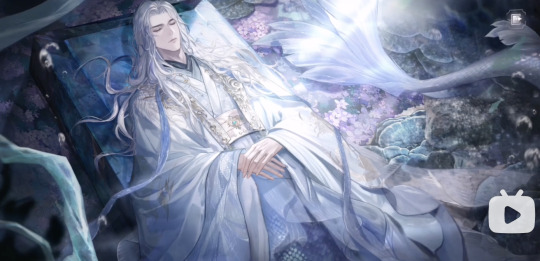
Meeting Incidents
Incident 1:
A legend circulates among the merfolk that at the end of the deep sea lies an untouched ocean region where a bright moon rises with the tide.
Ever since hearing this legend, I had been relentlessly pestering Xia Xiaoyin to take me to see it.
Xia Xiaoyin was initially reluctant, but seeing my persistent nagging, he finally agreed.
The end of the ocean region was a lightless deep sea, so quiet that only the sound of water could be heard.
Mist glowing with a faint light rose from the coral. I saw a kind of indescribable sorrow hidden beneath Xia Xiaoyin's solemn expression.
I squeezed his hand, and he gave me a faint smile in return.
Soon after, a golden full moon slowly rose from the horizon of the tidal ocean, illuminating the desolation that flashed across his eyes.
Incident 2:
Deep within the Mirage Palace lies a stele forest, inscribed with the history of the merfolk in ancient script. I was interested in the past of the merfolk, but I couldn't understand the writing, so I begged Xia Xiaoyin to help me interpret it.
The merfolk's historical records were like songs, passed down through generations in the deep sea tides. The stories told by the Sea Emperor were the most beautiful of all these ocean melodies.
I was captivated by this elegant singing, so much so that I had no desire to admire the illusions that appeared in response to the song.
Until I felt a flick on my forehead, and the singing abruptly stopped.
"Wake up."
His expression was somewhat displeased, but the corners of his lips were slightly upturned.
Incident 3:
There are many wondrous things in the sea. Every so often, merchants from other ocean regions would bring local specialties to trade at the market in the Royal Sea.
I bought many novel trinkets at the market and returned to the Mirage Palace with large and small bags, wanting to show Xia Xiaoyin.
His Majesty the Sea Emperor expressed his disdain, but he still looked at the treasures I had brought back.
He picked up one small jar, his expression subtle.
Getting closer, I saw the words "Seafishing Honeydew" written on it. Before I could explain, Xia Xiaoyin's dangerous gaze was cast over me.
"Buying this kind of thing... don't tell me you still want to go fishing for others?"
Incident 4:
The Sea Emperor's birthday occurs once every hundred years. On that day, the entire Mirage Palace would celebrate for him, holding a grand banquet.
However, even on Xia Xiaoyin's birthday, only he and I were in this vast Mirage Palace.
He looked at me from his throne, his expression arrogant yet seemingly expectant.
I sat on his tail and said the words he was waiting for, and then I realized that his silver tail had wrapped around me at some point.
In the end, I spent a birthday with him that was unforgettable in every way. The very satisfied Sea Emperor stroked my sore tail and said that his birthday could happen once a year from now on.
Nonsense. Wasn't it that as long as he wanted, every day could be such a birthday?
Incident 5:
There are also four seasons in the deep sea, and some rare marine life only grows in specific seasons.
A maidservant said there was a rumor of a mysterious flower coral that only grew in the southern seas. When it flourished every summer, it would turn the area into a sea of flowers, and any merfolk who saw this sea of flowers would be happy for the rest of their lives.
The coral's flowering period was very short. Before it was even time, I couldn't wait to ask Xia Xiaoyin to take me to see it.
Seeing that I couldn't stop thinking about those coral flowers after returning, Xia Xiaoyin used some method to transplant the coral flowers, which should have already withered, into the Mirage Palace's garden.
Worried that these would also wither quickly, Xia Xiaoyin snorted softly, as if I had underestimated his abilities.
"It's just a simple little spell... they won't wither so easily, don't worry."
----
Card Story
A while has passed since the Mirage Palace awakened and the sea people revived. Deep within the palace's secret realm, the Sea Slumber Flowers still bloom unrestrained, just as they did in the past.
There is no one else here; the only sound is the quiet murmur of the water.
The handsome merman lying in the sea of flowers has his eyes tightly closed. A petal sways and gently falls onto his brow, but he doesn't seem to notice.
What kind of fish sleeps in its little nest right before its birthday?
I reached out, carefully tracing the contours of his face, and also plucked a Sea Slumber Flower, intending to place it in his hair.
Before I could succeed, he reached out and grasped my wrist.
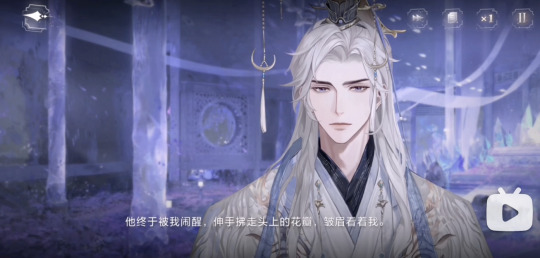
He was finally stirred awake by my antics, reaching up to brush away the flower petals on his head, frowning as he looked at me.
Xia Xiaoyin: What are you doing?
Me: I was wondering why you have a palace to sleep in but insist on sleeping here.
He glanced at me, his robes stirring the petals. Then, I felt a chill on my lower body as his beautiful silver fishtail wrapped itself around my thighs.
Xia Xiaoyin: Of course, it's to prevent some little mermaid from disturbing my peaceful sleep again.
I was sure he was still bothered by what happened before.
Me: Will those who disturb your peaceful sleep be fed to the fish?
I nuzzled his neck. He paused, then lowered his head.
It was a cool kiss carrying the scent of seawater, yet the mingled breaths were incredibly hot. His presence enveloped me, even overpowering the scent of the flowers blooming on the seabed.
After a long while, he finally released me. I saw that the corners of his eyes were already flushed red.
The Sea Emperor's thin lips parted slightly, carrying a hint of displeasure.
Xia Xiaoyin: That still depends on who it is.
He tightened his grip with his tail around me, the pressure so strong it felt like he wanted to swallow me whole.
I quickly begged for mercy.
Me: ...Let's talk about something else, like how you want to celebrate your birthday?
Xia Xiaoyin glanced at me, frowning as if he was also thinking. After a moment, he tossed the question back to me.
Xia Xiaoyin: You decide.
Xia Xiaoyin: But if you make me unhappy...
He lowered his voice and leaned closer, the threatening words sounding more like a lover's whisper.
His dreamlike, colorful pectoral fins were right next to my cheek. I heard a muffled murmur escape his lips, and then darkness obscured my entire vision.
In my hazy consciousness, that pale, slender hand slowly traced my eyebrows and eyes.
I seemed to hear a soft sigh.
Xia Xiaoyin: This time... you're not allowed to leave me again...
.
.
.
.
.
BtW Masterlist
If you'd like to support my translations and read them DAYS before they are published on this Tumblr, consider joining my Patreon!
Alternatively, feel free to leave me a tip here or buy me a coffee through the "Leave a Tip" button on my navigation bar. Thank you for all your support!
4 notes
·
View notes
Text
OLGA DE AMARAL
Fino alla fine di marzo, chi si trovasse a Parigi, non può mancare una raffinata esposizione che per comodità chiameremo di texil art, ma che è francamente qualcosa di più: si tratta della mostra sull’opera di Olga de Amaral, ospitata alla “Fondation Cartier pour l’art contemporaine”. In realtà, l’artista colombiana sembra occuparsi più di sentimenti e di stati dell’anima che di tessuti o, piuttosto, il tessuto e i materiali in generale sono solo un pretesto, anzi un “pre/testo”, per occuparsi di sensazioni, umori, stati d’animo, pulsazioni, illuminazioni. C’è chi lo ha fatto attravero la scultura, chi attraverso la pittura o l’architettura e chi attraverso la materia, soprattutto la materia tessile. Benché Olga de Amaral sia parecchio conosciuta, è assai raro vedere sue opere esposte in Europa e quindi questa va considerata un’occasione piuttosto ghiotta e interessante. “Mentre costruisco superfici, creo spazi di meditazione, contemplazione e riflessione. Ogni piccola unità che forma la superficie non è solo significativa in sé, ma è anche profondamente risonante del tutto. Allo stesso modo, il tutto è profondamente risonante di ogni singolo elemento”, queste le parole con cui la de Amaral descrive la sua poetica. Se fossimo in campo semiologico, potremmo azzardarci a dire che l’artista è creatrice di grandi “patterns” visivi che non sono formati da singoli materiali, ma da materiali interagenti tra loro o, addirittura, anche da opere o interi ambienti interagenti tra loro (e quello che è esposto alla Fondation Cartier ne è la lampante testimonianza). Dagli anni Sessanta l’artista colombiana lavora sui materiali tradizionali e sugli ambienti della sua terra natale, che ispirano le due serie di opere le Estelas (Stelle) e le Brumas (Nebbia), in particolare gli altipiani della cordigliera andina, le valli e le vaste pianure tropicali che vengono qui evocate in forme e toni. Dagli anni Settanta, l’artista adotta la tecnica giapponese del kintsugi, ovvero l’utilizzo dell’oro per riparare un’oggetto evidenziandone la faglia. La tecnica, acquisita dalla frequentazione con la ceramista Lucei Rie, le permetteva di donare al tessuto quell’effetto di iridescenza tipico dell’oro e ben presto, la sua produzione amplia i suoi orizzonti, anche oltre il Sudamerica. Da un punto di vista tecnico la grande novità è l’abbattimento dell’idea di lavoro tessile come intreccio di trama e di ordito, concentrandosi sul solo ordito, lasciato fluttuare liberamente e rendendolo creatore di mondi: alchimie, cestini lunari, immagini perdute, tessuti cerimoniali, scritti, foreste, fiumi, montagne, lune e soli, quadrati, ombre e stele, un mondo segnico e allusivo molto complesso, benché assolutamente intellegibile attraverso le nostre singole sensibilità. Senza adottare un ordine strettamente cronologico, la mostra mette in luce i diversi periodi che hanno caratterizzato la sua carriera artistica: dalle sue prime esplorazioni formali (uso della griglia, colori) alle sue sperimentazioni (con materiali e scala), così come le influenze che hanno nutrito il suo lavoro (arte costruttivista, artigianato latinoamericano, era precolombiana). Magnifico lo spazio espositivo, progettato dall'architetto franco-libanese Lina Ghotmeh che si è immersa nelle fonti di ispirazione della de Amaral: al piano terra dell'edificio di Jean Nouvel, circondato dal giardino di Lothar Baumgarten, è stato creato un ambiente di gigantesche pietre di ardesia che mette in collegamento l'interno, l'esterno e le opere, come se fossero incastonate in un paesaggio pietroso e accidentato. Mostra di rara e discreta bellezza, in un luogo sempre di indiscutibile fascino.





3 notes
·
View notes
Note
hello elle! i've noticed you haven't posted as much as usual and i figured that's something every writer goes through but i'm rooting for you! right now i'm trying to work on a waywood longfic that i hope to start posting this year 😅
hope things go fine for you, you always have my best wishes. since you said you're open to anything, maybe do you feel like to write more waywood? you'll have my enthusiasm and joy supporting you 😆
from the prompt list you posted, some i felt that waywood could go for were 4, 5, 7, 22, 47, 189 and 193. of course, you should only write what you feel like writing ☺️
(Read on AO3)
People always say that children can be cruel, but they often overlook the fact that they take after the equally heartless adults who raise them.
It was one thing when the other students taunted Robert for his family history - whenever he does too well, or too poorly, it’s either ‘good to know you’re smarter than a worm’ or ‘what did you expect from a Lightworm?’. Robert was used to that. No matter how far his family came, no matter how much distance they put between themselves and Benedict’s legacy, it never seemed to be enough.
It was another thing to have one of the Institute’s Professors step in to break up a fight and say “Why am I not surprised to find a Lightwood at the heart of another problem?” when Robert had done nothing wrong. He’d never done anything wrong. He’d done nothing but his best to keep turning his family name into something positive, something to be proud of. It was never enough. He was never enough.
And the one person who thought Robert was enough, Robert pushed away.
Robert didn’t wait for the Professor to finish before he turned, started running, and didn’t look back.
Robert hadn’t spoken to Michael in days now… or was it weeks? And yet in this moment, getting more lost by the second as he made his way through the pitch-black forest, everything inside of him screamed for Michael’s company.
Robert tripped over a root, or a rock and fell hard to the ground below. He felt a cut across his knee, the pain of a twisted muscle in his wrist, and even though he could get up if he wanted to he chose not to. He sat there, on the cold, hard ground, and his heart, mind, and soul all yearned for Michael to be by his side.
He didn’t know how long he sat there. He thought he may just stay on the ground forever, honestly. The next thing Robert knew, he heard the crunching of branches approaching, and then Michael was by his side.
“You’re hurt,” Michael said, reaching down for Robert. It wasn’t a question.
“Why are you here?” Robert asked, pulling his arm away from Michael’s reach and immediately regretting the action as a new sting of pain traveled from his wrist up the length of his arm.
“You’re hurt,” Michael repeated.
“The last time we spoke…” Robert trailed off.
“You were a proper asshole,” Michael confirmed, already pulling out his stele.
“Then why are you here?” Robert repeated.
“Because I could feel you out here, Robert. Hurting. Calling for me through our bond, whether you meant to or not. We’re parabatai…” Michael hesitated, but only for a second before pushing forward. “...and I love you. I told you that I’d never leave you; I’m not going anywhere.”
Michael held his stele over Robert’s healing rune, looking at Robert expectantly. Even after all this, he wanted to respect any boundaries Robert might set. Robert nodded slowly, closing his eyes against the comforting sensation of his parabatai activating his rune spread through him.
He didn’t know what to say. He wasn’t sure what he could say that would excuse his past actions, or show Michael the sort of appreciation he deserved for staying even now. Why should Michael bother to come all the way out here and help the person who kept trying to push him away?
But Michael was his Parabatai, and Robert should’ve known better than to think he’d have to say anything at all. In the silence that fell between them, Michael seemed to read his mind.
“I will always choose you, Robert. Even if you won’t always choose me.”
Robert didn’t deserve Michael, didn't deserve his reassurance and comfort... but just as Michael chose to be here, Robert could choose to accept it.
And he did.
#robert lightwood#michael wayland#waywood#tsc#shadowhunters#elle writes a few deadbeat lines#I fused two of these together for this one#it's been ages since I've written them so I hope it's alright <3 <3#and I hope your fic writing and life in general is going well!!#ask rune#inquisitor-of-the-circle
16 notes
·
View notes
Text
Dozens of "Breton" communities that settled in the land at some point between the 5th and 7th centuries have left their imprint on Breton toponymy. They founded the 220 or so plous: parishes organised around a church and its village, gwi-in Breton. These communities were often associated with the name of a man who was identified as the eponymous founder, the "saint" or the "chief", who could be a member of the clergy or a layman. The plous corresponded to a territory that was later delineated by geographical elements, such as rivers, roads or forests. At that same period, the landscape was christianised through the setting up of hundreds of monolithic crosses, sometimes erected on top of Iron Age steles, while fountains or even chapels were built on the sites of former places of worship, like springs. Other toponyms bear witness to the Bretonnisation of the territory: Lan, for instance, which indicates the existence of a hermitage or monastery which sometimes became parishes in later times, like Landévennec or Landerneau. Toponys starting with Tre- used to describe hamlets or districts. Some of them occasionally became parish subdivisions, named trèves. The term lez or lis seems to have applied to a court — an aristocratic residence. The Breton language — Old Breton — is mainly known through surviving words, hundreds of glosses or notes appearing in the texts essentially written in Latin. Thousands of placenames or names of individuals can be found in such documents, mainly in charters. The educated members of society in the west of the peninsula were bilingual, speaking Breton yet writing exclusively in Latin.
Patrick Kernevez, From Kings to Dukes: Brittany Between the 5th and the 12th Century
2 notes
·
View notes
Text
Chapter 4: Black Tide Rising
Narrated by no one.
Narrator: Flo took one last longing gaze at the crumbling altar and murmured his final prayer to the ancient god.
Flo: Great Arionus, I will follow you to the ends of the world, 'til the forests die and the oceans dry up...
Narrator: With every word that fell from his lips, Flo's misty form dissipated bit by bit into specks of deep blue floating lights, like warm, passionate teardrops.
Narrator: The swaying sparks gathered around Mercury's hand, bleeding bit by bit into the azure gem.
Flo: Great Arionus, heed my prayers...
Narrator: Flo's last words faded away into the mist. The wisp that only remained for so long due to obsession finally accepted its demise.
Narrator: Elves, after all, were destined to come back to nature. Flo's dedication brought him prolonged pain, but he never stopped seeking his god even to the very end.
Narrator: What he never realized, though, was that the person who brought him the ray of hope was never a believer of the God of Water to begin with.
Narrator: Mercury's New Moon gem began to gleam, more brightly than ever before. A wild force surged in it as the ancient powers were finally ready to be awakened.
Mercury: The time has come to prepare.
Narrator: As the light dimmed, calm returned to the space. The last tear fell to the ground, trampled beneath uncaring feet on the way out.
Narrator: Mercury Group has always been highly efficient. Viper and his men fished the stele out of Lake Bovaly quickly, and Alan soon translated it.
Narrator: Hymns singing the praises of Arionus, the God of Water, were etched upon the stele, and contained many more clues toward awakening the god.
Narrator: The songs and poems of old are often nothing more than idle grasps at romance, but a sharp eye can divine the truth within them.
Narrator: The explorations of Lake Bovaly opened a viable path for Mercury, and the gates of the abyss shall likewise open for him with Arionus' awakening.
Narrator: Mercury heads to the open sea, to tell the Elves of Water that he has found where Arionus is sealed.
Narrator: Mercury vowed to the leader of the Water Elves to wake up Arionus, to break the blood oath between the Elves of Water and Light with the aid of the gods...
Narrator: ...and to lead them in a conquest to retake the continent.
Water Elf Leader: The friend of my people shall bring back our great ancestor, and reclaim our long-lost glory.
Narrator: The tribe, desperate for anything that would further their vengeance, has no reason to turn down his aid...
Narrator: ...and thus Mercury receives the scepter, passed down through the generations, from the leader.
Narrator: At the same time, Alan gives Ophelia the ancient Pigeon codex, which records Glory originates from flame.
Ophelia: The road ahead may be littered with thorns and traps, but I will forge ahead regardless and recover Pigeon's glory at the road's end.
Narrator: The puppet queen who will do anything to restore her kingdom's glory will not give up this opportunity...
Narrator: ...and will soon venture into the Mist Forest alone, in search of the altar of the Fire Elf.
Narrator: Everything is proceeding according to plan. All he has to do now is wait.
Narrator: The altar deep in the Mist Forest quickly lights up with blue and red flames.
Narrator: The Pigeon coast is beset by tidal waves as the Elves of Water await the return of their ancestor.
Narrator: The tides may be enough to rouse those slumbering nobles from their idle fancies, if only for a moment.
Narrator: Yet Pigeon's glory shall not be destroyed in this disaster.
Narrator: The Elves of Water are too proud, too strong. They've been broken down by too much despair, and are all too willing to place their trust in others.
Narrator: Sequestered away in the deep sea for centuries, they have precious little knowledge of the state of the world.
Narrator: The stronger their desire for revenge, the further they stray from their goals.
Narrator: Everything is prepared. Arionus, the God of Water, shall open the connection between Pigeon Forest and the Ocean of Memories.
Narrator: It lies there, in the heart of the forest, where the elven prince is already headed.
Narrator: As he's said from the beginning, this is all but an experiment to peer into the Abyss.
Chapter 1
Chapter 2
Chapter 3
#mercury#shining nikki#chapter 4#black tide rising#tides and flames#anniversary#lake bovaly#arionus#elf#god#water elf#power#abyss#promise#transcript#ssr designer
2 notes
·
View notes
Text
Apr 11, Xi'an, China, Beilin Museum (Stele Forest) scenery:
The entrance:

A Chinese redbud tree (Cercis chinensis Bunge):

You can see fossils (the swirly thing) on the ancient stone pillars:
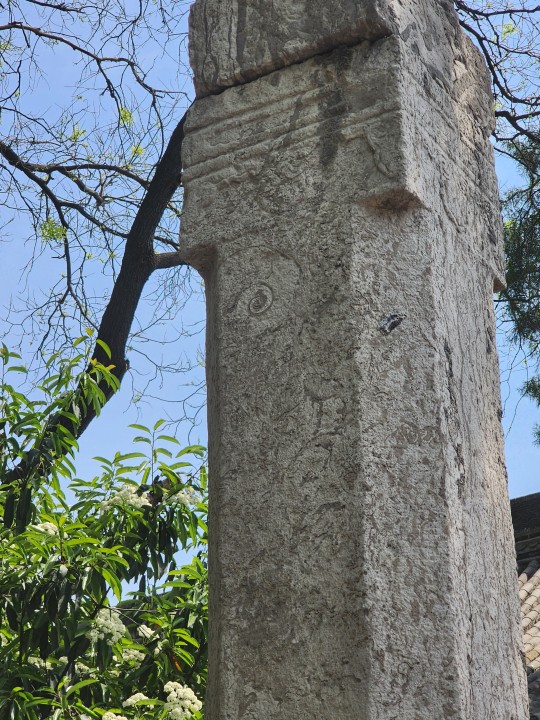
An old pavilion:
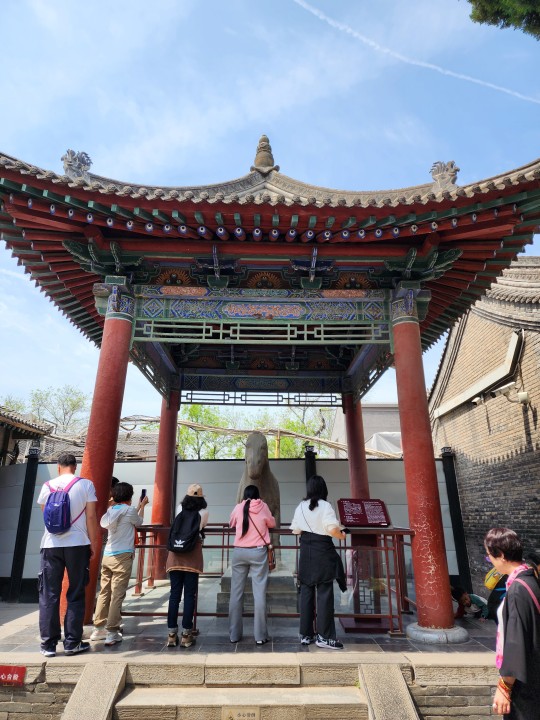
The inside of the roof of the pavilion:

A Qing-era pavilion housing steles that praised the emperor (locked, not open to public at the time):

Some species of maple tree?
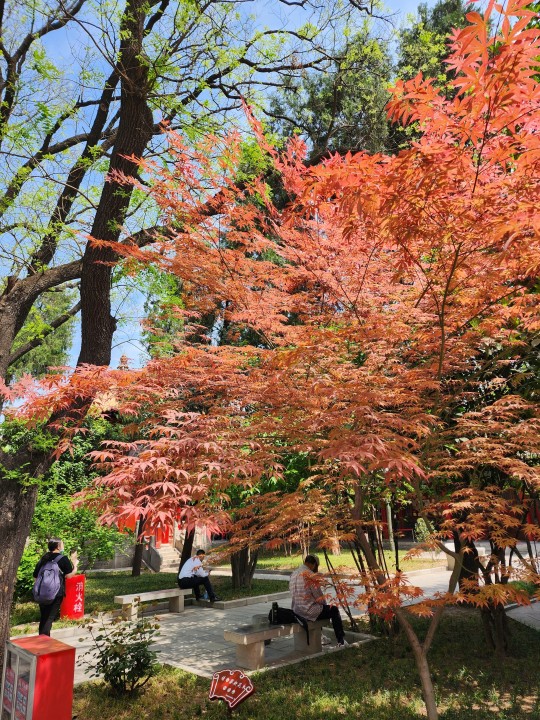
Beilin Museum is located in what was an ancient Confucian temple, thus the giant 孔廟 on the yingbi/影壁 wall:

The paifang/牌坊 of the original Confucian temple:
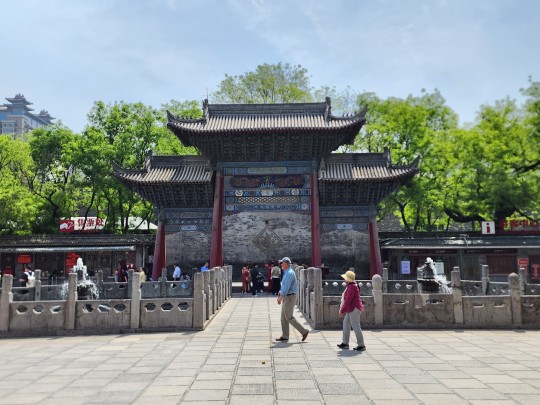
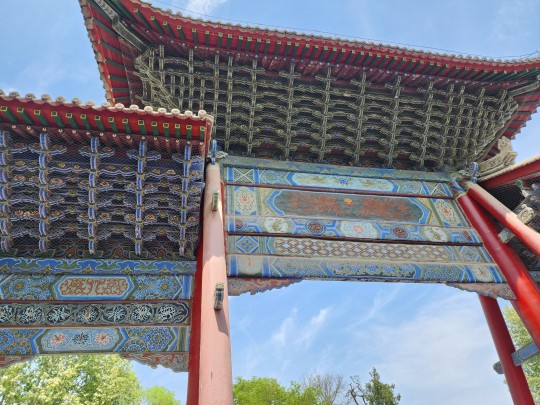
#2024 china#china#chinese history#chinese architecture#xi'an#beilin museum#stele forest#chinese culture
81 notes
·
View notes
Text


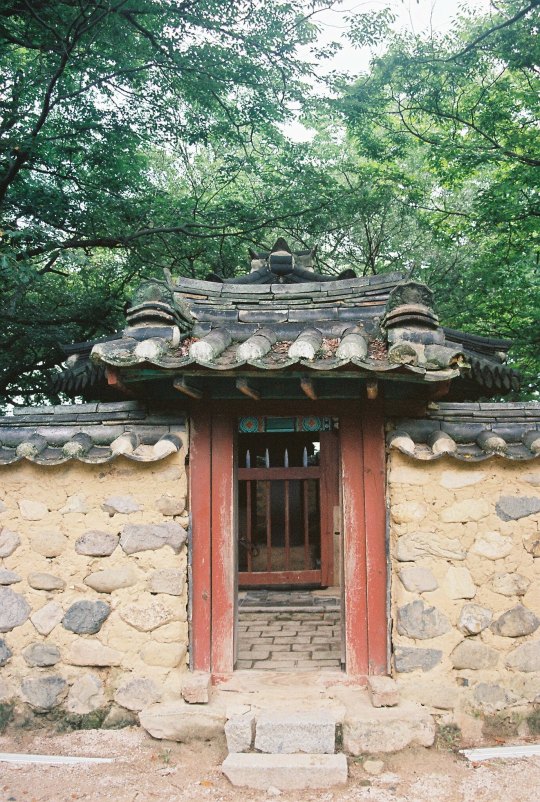


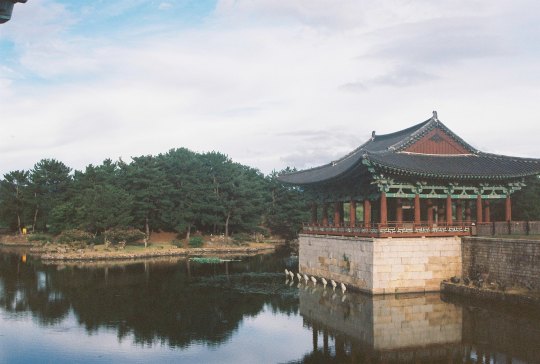
Gyeongju, South Korea (2) (3) (4) (5) (6) by Caspar Tromp
Via Flickr:
(1) In the distance is Cheomseongdae, a 7th century astronomical observatory whose construction was ordered by queen Seondeok. It features 365 stone blocks representing each day in the year. It is the oldest remaining astronomical observatory of East Asia. (4) An old (Silla period?) stele encapsulated in a traditional sacred kiosk or shrine, inside the Gyerim forest in the middle of the historical sites of Gyeongju. Both shrine and forest have a very mystical atmosphere. (5) (6) Wolji Pond. Remains of a 7th century palace dating to the Silla dynasty.
#cloudy#landscape#meadow#flowers#zinnia#gateway#stone wall#historic landmark#shrine#ponds#south korea#north gyeongsang province
25 notes
·
View notes
Text

Sunday May 4/ 2025
This morning, we walked to the Drum Tower and then the Bell Tower followed by breakfast at Starbucks. Then we walked through a series of tunnels full of shops and several markets to arrive at the Beilin Museum: a forest of stele. A stele is a stone panel inscribed on both sides with sacred Buddhist text and sitting on top of a giant tortoise or other animal.
Next we bought our tickets and went up many stairs to the top of the wall. Unlike the Great Wall of China, the Xian wall is only 22 km long, but is wide enough to park six buses beside one another. However, there were so many people. I was pushed, stepped on, coughed on, and sneezed on! I was losing my patience, but we decided to cut it short and get back to the hotel. We stopped at McDonald’s for a late lunch.
After couple of hours of resting, we went out to see if we could buy tickets to a traditional Shaanxi opera. We got front row balcony, and I decided to dress up in traditional Chinese clothing like the hundreds of tourists. I had seen walking the streets in traditional costumes. I picked the one I liked and then sat down for an hour of hair and makeup. The talented ladies were excited to work on a tourist who wasn’t from China. They took lots of pictures with me. The hairpieces weighed a ton and the makeup was pancake flour white. They gave me jewelry, false eyelashes, temporary tattoos, and the reddest lips I’ve ever worn.
I definitely looked like one of the players in the opera and got lots of positive comments from the Chinese locals in the lineup. The opera was noisy. The usher we spoke with explained that people in this part of China yell a lot, and so this shows up in their singing. After the first hour, Simon put earplugs in!
The play was a beautiful harmony between singing, music and movements. The costumes with very long sleeves gave the actors an opportunity to speak with their movements. However, as much as I was enjoying it, I couldn’t handle the screaming and loudness of it. So we left in the middle of the show and returned my costume and hairpieces.
As we were walking back to our hotel, both towers were lit up, shining through the night. Everybody in costumes was hiring photographers to take their pictures in front of the two towers. Unfortunately, I had just returned mine!
0 notes
Text
Find the Word Tag Game!
Thank you for the tag, @treesandwords! My words are clear, spice, fix and nature!
Your words are Rough, glass, shatter, and electric.
Tagging @pluttskutt, @illarian-rambling, @hippiewrites, @patternwelded-quill and @abalonetea Clear (Clearly counts I hope but just in case I will also include just clear as a bonus)
Zatar tapped his fingers impatiently, blind to the world of spirits and magic, but the sage saw it clearly; a tangled mass of paws and fang-tooth heads, as if by some freak accident several of the small gray-furred foxes that roamed the mountains had been melted down and combined into one misshapen and writhing form. It gazed up at him with six sets of eyes, hungry, expectant. Unlike larger spirits, such as those of the wind, this forest spirit could not speak, but it could make its thoughts known. Though repulsed by the twisted creature, the sage reached out with his mind, tentatively, letting the spirit see his thoughts, laid them bare for inspecton. He felt the creature, rummaging through his memories, his hopes and his fears, relishing in the wealth of information it found within. He wrenched the spirit’s attention away from his childhood hopes, and directed it to the issue at hand. He expressed his wish in a series of mental images and faint memories of sensation. The forest spirit responded with its own. Back and forth they went until a deal was struck.
Clear
The demon lunged at him, swiping with its great black talons. Narul only just jumped clear. A second later, another claw lashed at him, grazing his leg. Narul gasped in pain, looking down at the burning wound. There was no blood, for the claw blazed with such intensity that it had cauterized the wound the instant it had pierced Narul’s flesh.
Spice
"Think it's going to rain?" Suru asked, as he gazed up at the gray expanse. Narul responded with a half hearted shrug Suru rolled his eyes and leaned back on the stele, his eyes drifted shut. Narul glanced at his brother and considered trying to wake him up but decided against it. He turned back to the actors, easily able to watch over the heads of the crowd. The first act had just finished, the creation of the cosmos, the birth of humanity, the Great Calamity, the rise of Shabala, it always amused Narul that so much history could be told in only an hour. The performers left the stage to change their costumes and to wet their throats. Taking advantage of the break, slaves delivered pieces of the steaming roast bull to each of the nobles.. Hutbari and his retinue ate eagerly, either eating the meat by itself or else first dipping it in the puddle of juices, spices, oil, and herbs that had accumulated on their plates. Hutbari whispered something to one of the serving slaves. With a weary expression, the server pushed his way through the crowd, hunched over the plate of beef to protect it from any grasping hands. Shortly thereafter a disheveled and annoyed slave appeared in front of Narul and offered the plate. “From the king.” He said. Narul smiled and took the plate, lifting a piece of the dripping meat and placing it in his mouth. He had tried beef before, though not often, typically in the form of sausage or offal. This was different, tender, and warm, accentuated by the herbs and spices that coated its pink surface. The slave who had delivered the morsel watched the plate longingly.“Ahem, Narul, may I try a little? Just a bite…” Narul felt a twinge of guilt, it had been a stroke of good luck that Hutbari had relieved him of servitude for that evening. “Oh, of course, Ku, take as much as you want.” Ku didn’t need any encouragement, he took a large handful of the shredded meat and eagerly stuffed it in his mouth. He closed his eyes in ecstasy and smiled. He then nodded and started to make his way back through the crowd with a bit more enthusiasm than before.
Fix
Fasti and Zures had volunteered to recover the dead, to fix the damage that Ninma’s mad scramble had caused. And they were the last two to say their own goodbyes.
Nature
Aside from the wrecks littered on the beach, the island showed no other signs that humans had ever set foot there. There were no homes nor roads. Narul was unsure whether the lean and shaggy sheep that watched them pass from high on the surrounding crags were wild or had once been shepherded. Narul looked into the mouth of the cave with apprehension. The rest of the island seemed pristine, untouched by human hand, but looking into the darkness, the sailors all agreed that it could not have been constructed by nature alone. Someone or something had dug deep into the gray stone, bored through like a grub through rotten wood. The perfectly circular tunnel penetrated deep into the island; there was no end in sight.
#writeblr#writing#fantasy#fantasy writing#worldbuilding#testamentsofthegreensea#fantasy world#find the word game#tag game#wip#current wip
12 notes
·
View notes
Text
Under Deepspace 03: Talented Hunter, pt 01-11
01: Order Number 85: FMC is sent on a mission to investigate and resolve a fluctuation in No-Hunt Zone 7, Zone IV, but her partner hasn't arrived.
.
02: No-Hunt Zone No.7: FMC decides to make her way in without her partner. From the ground, she sees Shen Xinghui confronting a Wanderer, and wonders if he's comforting it. It explodes in a blast of light, and Shen Xinghui destroys its protocore. The red collar appears around his neck. He confronts her, and she gets caught in one of his traps while trying to explain herself.
.
03: Reunion Under Moon: After wrapping up her sprained ankle, Shen Xinghui suggests that she leave, as the . He notes that it isn't the Metaflux surges she has to worry about, and that many Tenebrae who go there seeking high-grade protocores to sell are never seen again, once they've obtained them; that the forest itself is alive, and consumed them. FMC tells him not to scare her, but he directs her to leave the forest while he goes off in the opposite direction.
.
04: Maze: FMC considers whether or not Shen Xinghui is her partner. There is some brief comedic back-and-forth where he comes back to check on FMC, he goes out and kills a bunch of Wanderers, he comes back to check on FMC, he goes out and kills a bunch of Wanderers. He tells her he's decided he shouldn't leave an injured teammate behind, but his identity can't be verified by her Hunter's Watch. She wants him to prove who he is. He uses his Evol, and creates a 3D pattern made of several diamonds. He asks if she looks familiar; she tells him it doesn't, and the light flickers. ("Maybe Shen Xinghui was hoping to hear something else.") He tells her to keep an eye out for the pattern, as it can appear on the Flux Nexus, a device that captures Metaflux.
When FMC continues to doubt him, Shen Xinghui drops it; when FMC asks him what a Flux Nexus looks like, wanting to compare his information to Tara's, he uses her words against her and reminds her that nothing he says can be verified, so why would she believe him? But his description of the Flux Nexus matches the description of the stele at the abandoned research base.
.
05: Exit: FMC wonders why she and Shen Xinghui always seem to be trapped together every time they meet. He asks her why she always happens to be around when he's in trouble. They locate the Wanderers causing the spacial irregularities; before FMC can finish her suggestion on how to deal with them, Shen Xinghui has taken care of them.
.
06: Awakened Forest: FMC and Shen Xinghui banter a bit; she wants to know what his deal is, reminding him that he said he'd explain everything the next time they met. He tells her it's a long story, and asks if she really needs to keep her guard up. She says he hasn't been honest, but they can 'work together for now.' They find the Flux Nexus, in the location of a former signal station. FMC realizes that the Metaflux is converging on the Wanderer, which is absorbing it. Shen Xinghui identifies the Wanderer as an Aeonwyrm, and that the Metaflux particles are being used to reconstruct it. Shen Xinghui tries and fails to activate the Flux Nexus, and says FMC should sense its energy and use her Evol to create the same fluctuations. She does so, and the Aeonwyrm evaporates, leaving only a yellow protocore. Shen Xinghui points out that the fluctuations prove that someone wanted to resurrect the Aeonwyrm. Shen Xinghui appears to be very in tune with the forest, claiming that 'it's waking up,' before entering combat.
.
07: COMBAT
.
08: Where Light Vanishes: Shen Xinghui and FMC escape the Wanderers by virtue of Shen Xinghui's Big Leap Trick. Upon inspecting the protocore obtained from the Aeonwyrm, Shen Xinghui explains that it's been modified, and the modification is the work of the organization, Onychinus, which is stationed in the N109 Zone, which carries the infamous achievement of modifying protocores. Shen Xinghui tells FMC that the moon is much brighter, so she'll be safe to head home, while he walks back into the forest on his own. As the camera pans back, there is a shot of a black, quasi-mechanical crow with red lenses for eyes sitting on a branch.*2
.
09: Another Predicament: There is a flashback from the FMC about the attack on Linkon; references to the rusty rain, the ruined streets, and the red moon that slowly blackens, as though it's an eye blinking at her. Coming back to the present,*1 she reminds herself to get in contact with Nero about the eye she saw. She sees Shen Xinghui, in his hunter uniform, being accosted by journalists. ("I don't really have dreams... Also, I'm the only person in my family.") There is mention of complaints that hunters have been destroying public facilities under the pretense of eliminating Wanderers, but when FMC tells Shen Xinghui to beg her to save him, he does. So she does. She notes that it's strange to see him in broad daylight without any disaster surrounding them. Jenna arrives in the office to give them a briefing.
.
10: Invitation: Jenna explains that the protocore has both red and blue protocurves, proving that it's been modified. She calls it 'a gift from Onychinus,' and that they clearly know more about the protocore than they do. She says they'll need to use FMC's Evol to locate and obtain more information. She says Onychinus' goals are unknown, but given Qin Che's track record, it's not about money. She instructs FMC to take the next two days off.
.
11: Selection: Shen Xinghui and FMC eat gross dry bread and discuss the plans going forward; he advises her to not join the project. FMC says she'll take Shen Xinghui as her partner, because his teleporting ability is useful. He reminds her that her Evol might not be the only option, and to keep her options open. ("You might enter a world that's beyond your wildest imagination.") He expresses his worries that she might have just said yes without thinking it over, that she might not be fully informed about any dangers that lie ahead. He was also worried she wouldn't choose him as her partner.
.
.
*1, This event occurs the next morning. *2, In hindsight, we know this is Mephisto.
#love and deepspace#main story#ref: shen xinghui#ref: tenebrae#ref: flux nexus#ref: onychinus#ref: n109 zone#ref: mephisto#ref: qin che#ref: protocore nexus#ref: terrastele
0 notes
